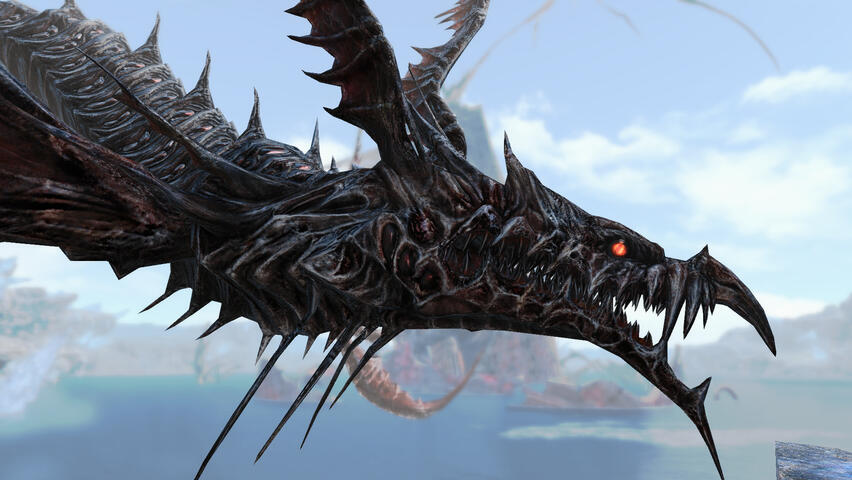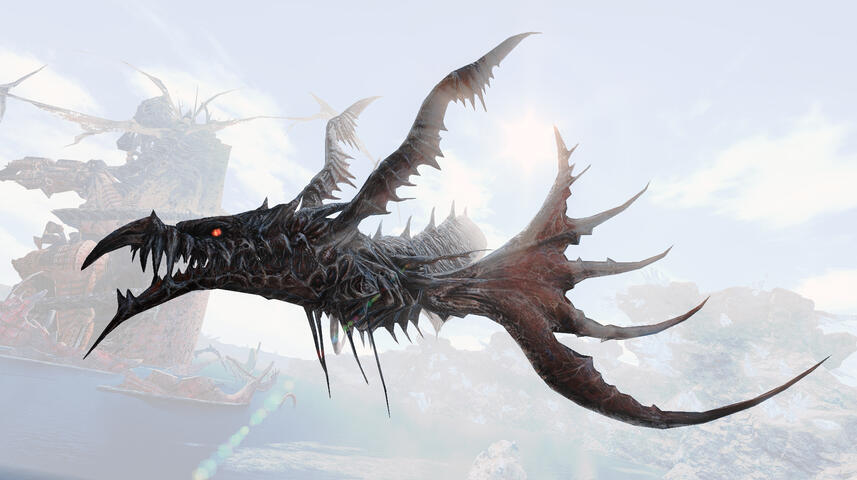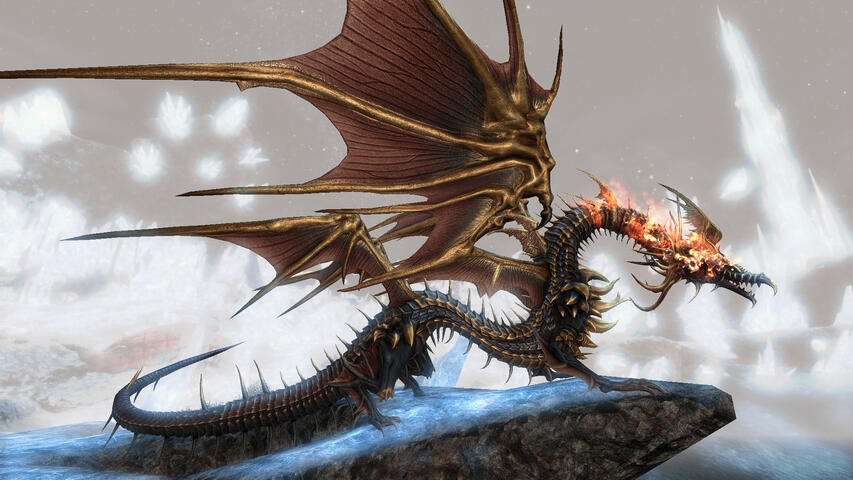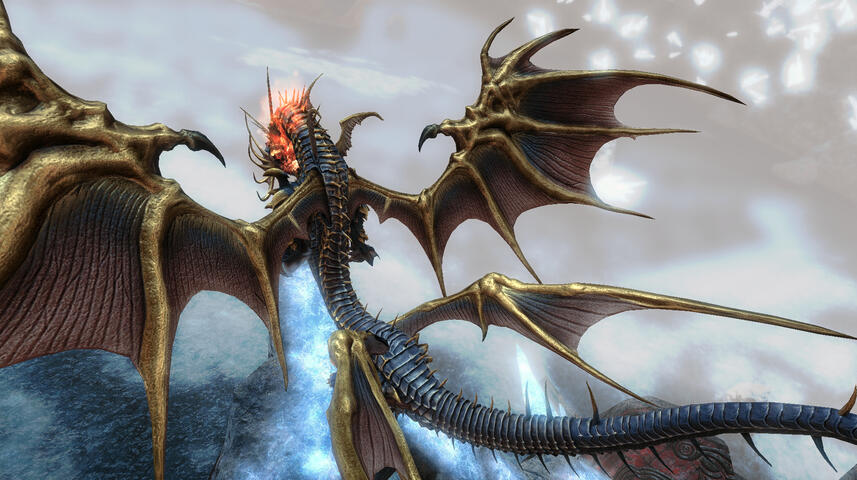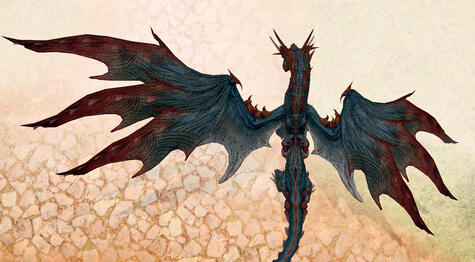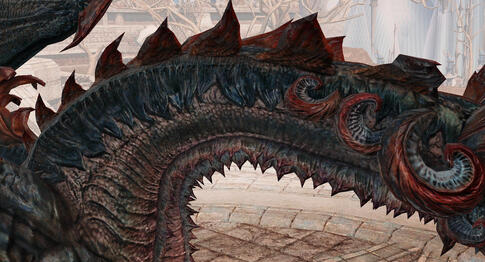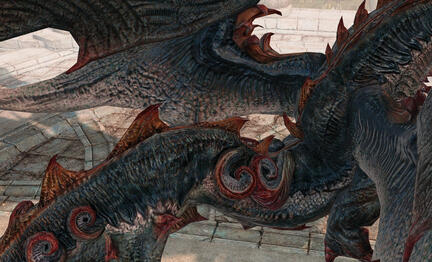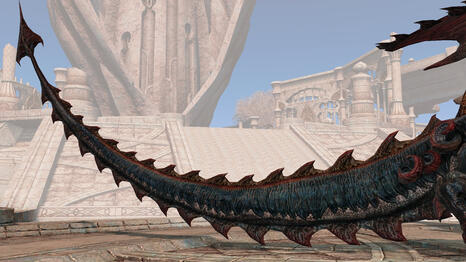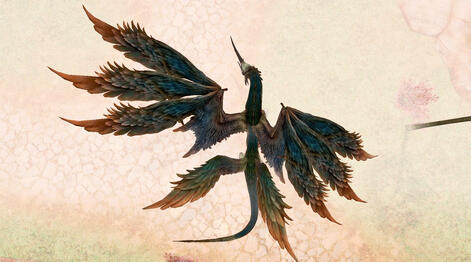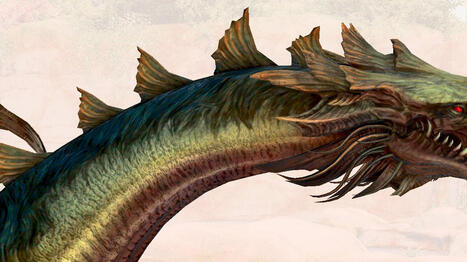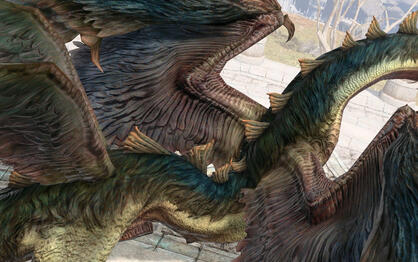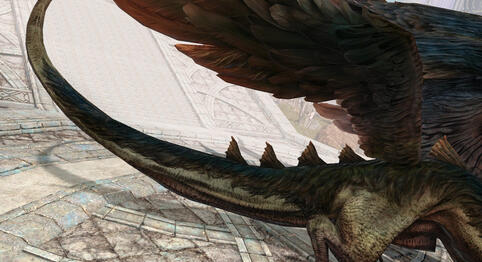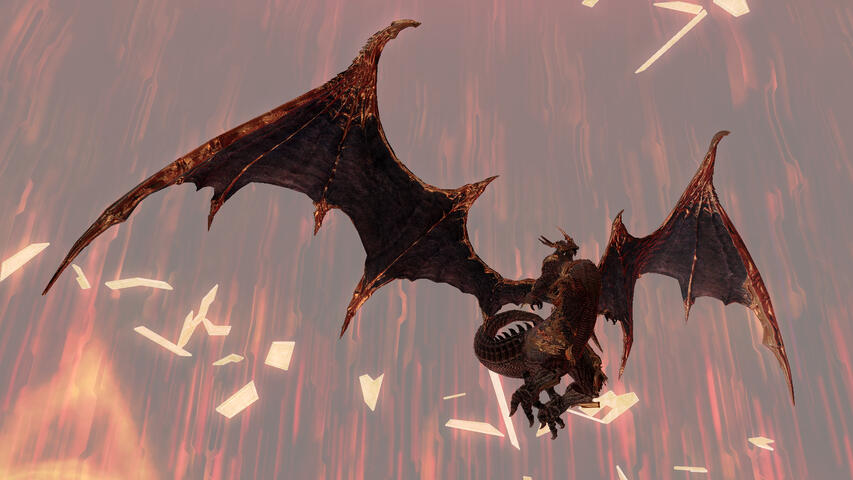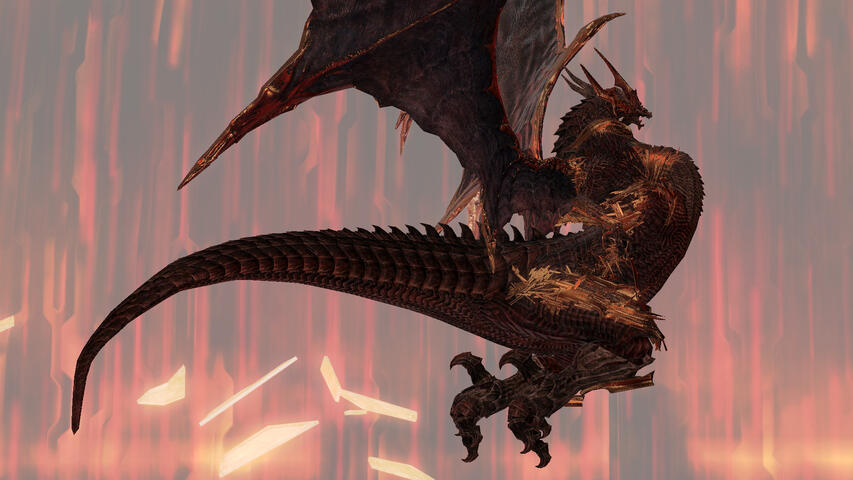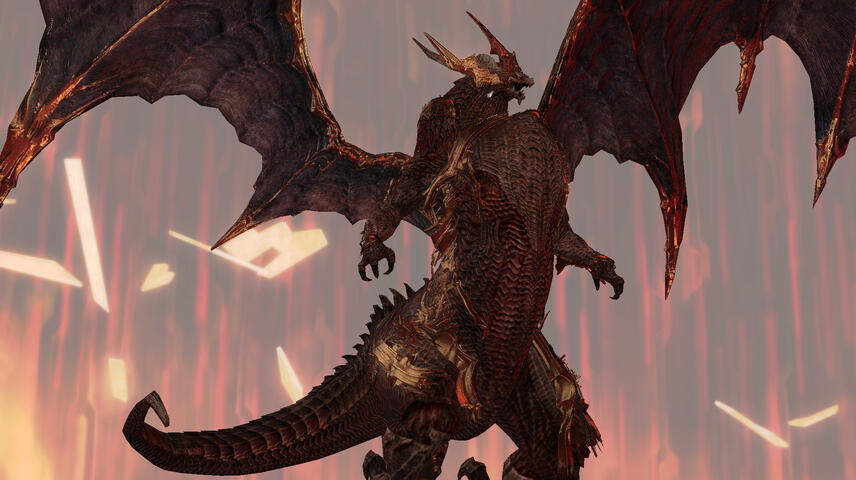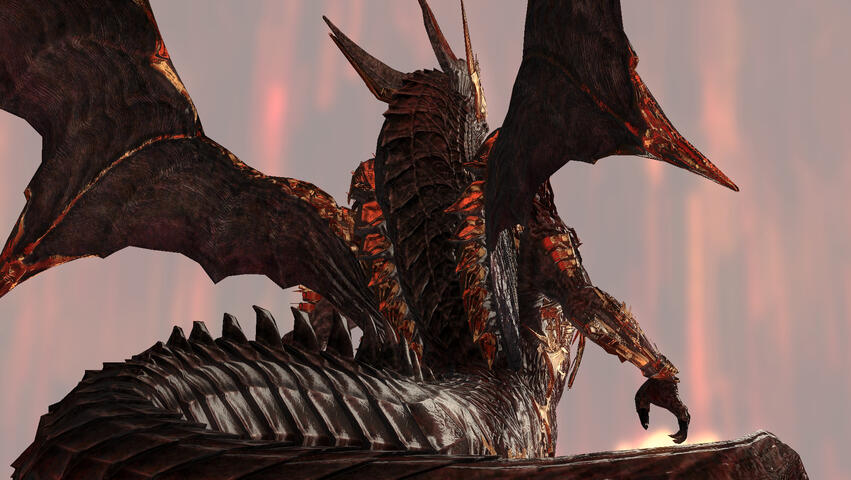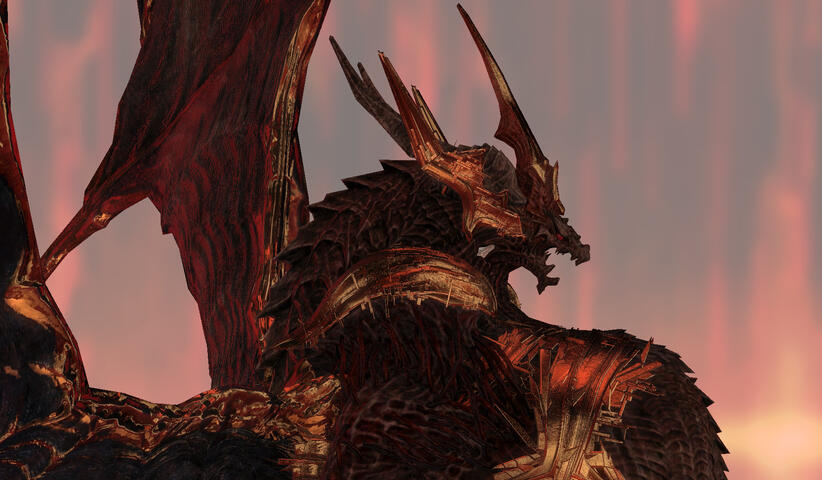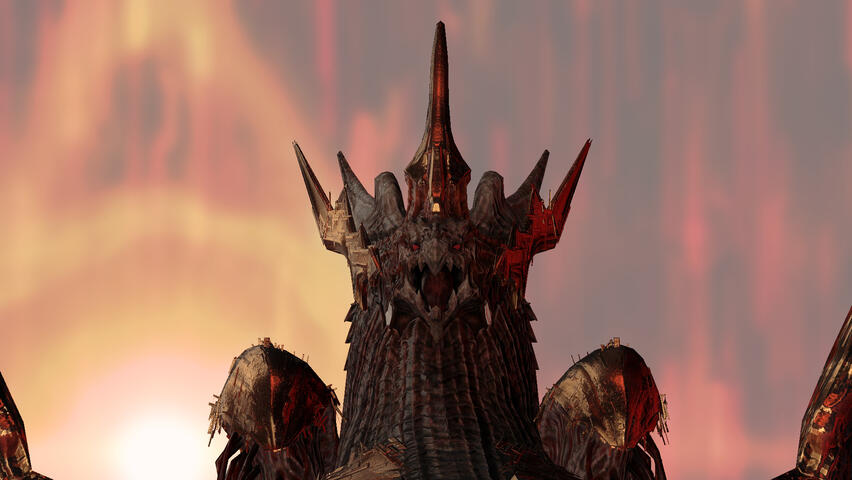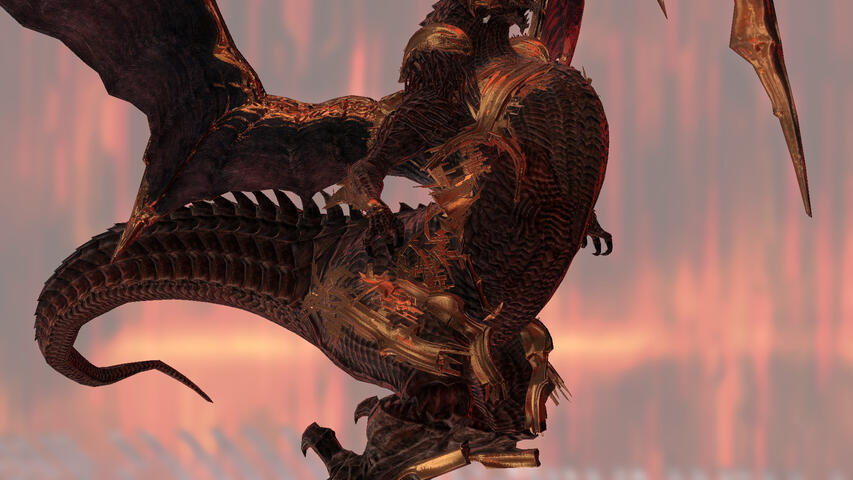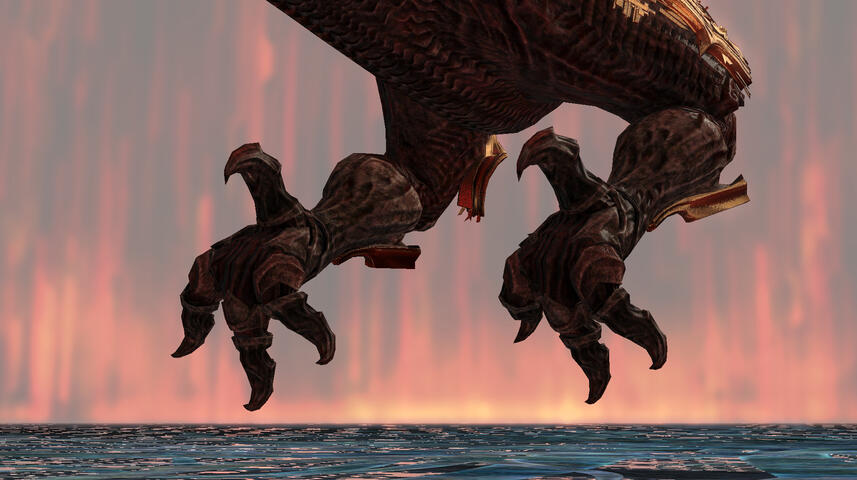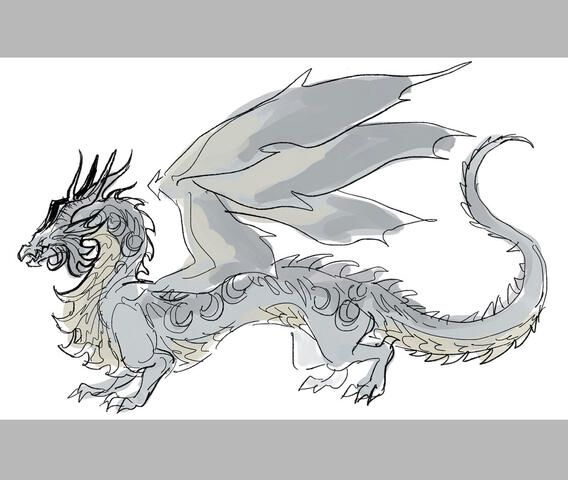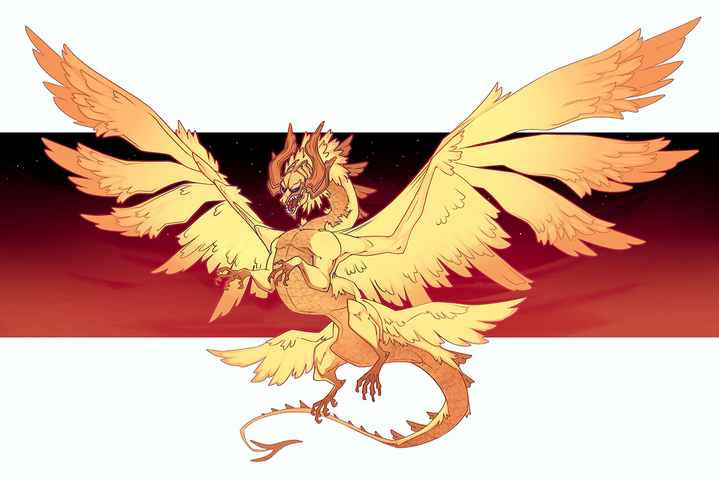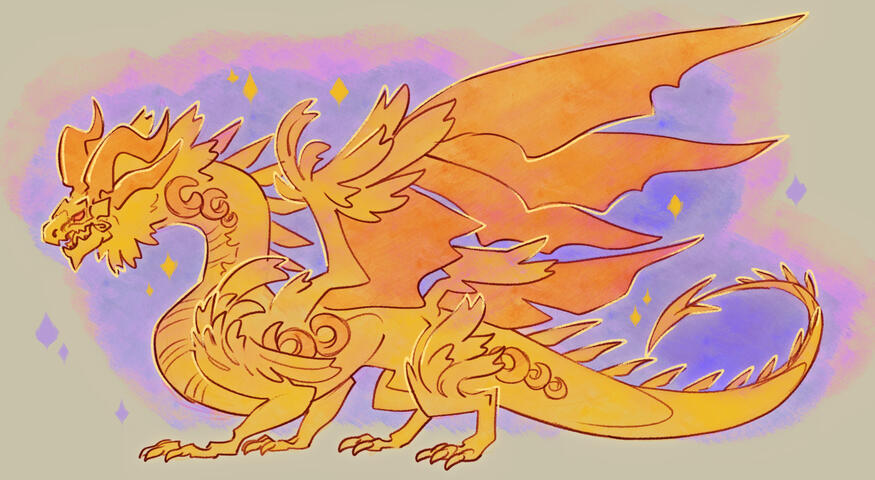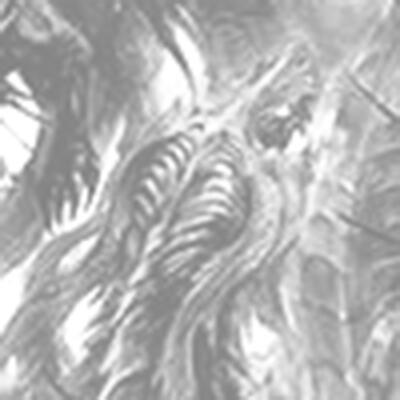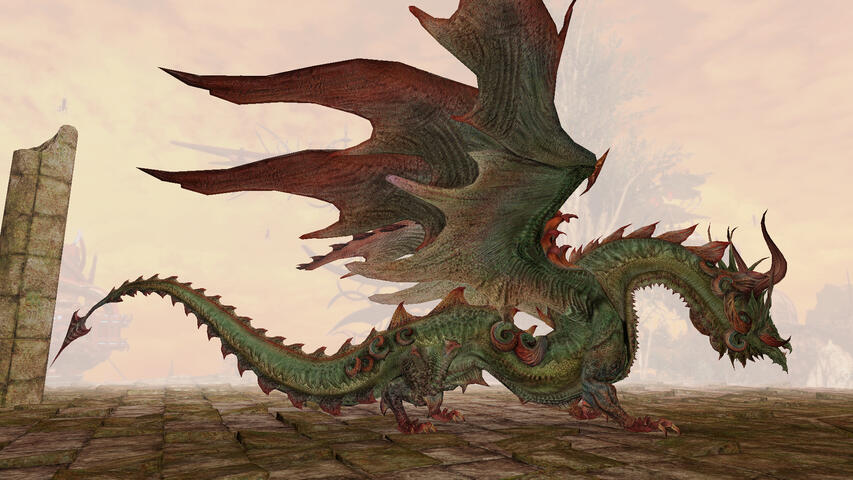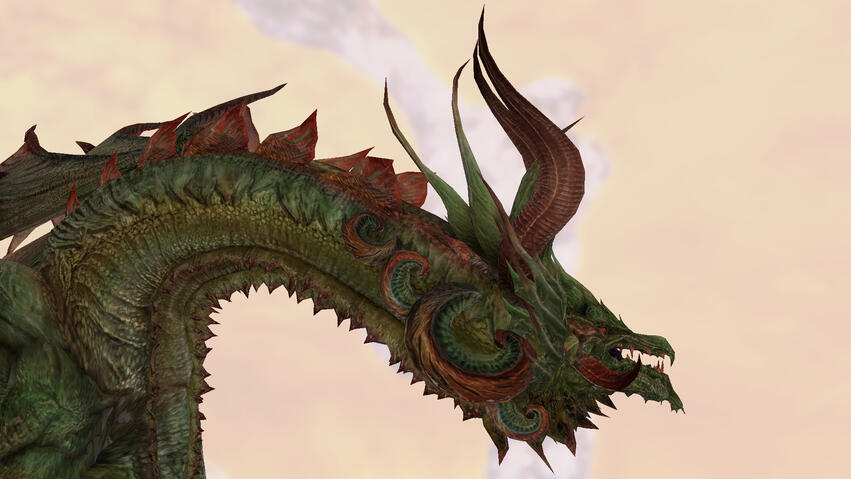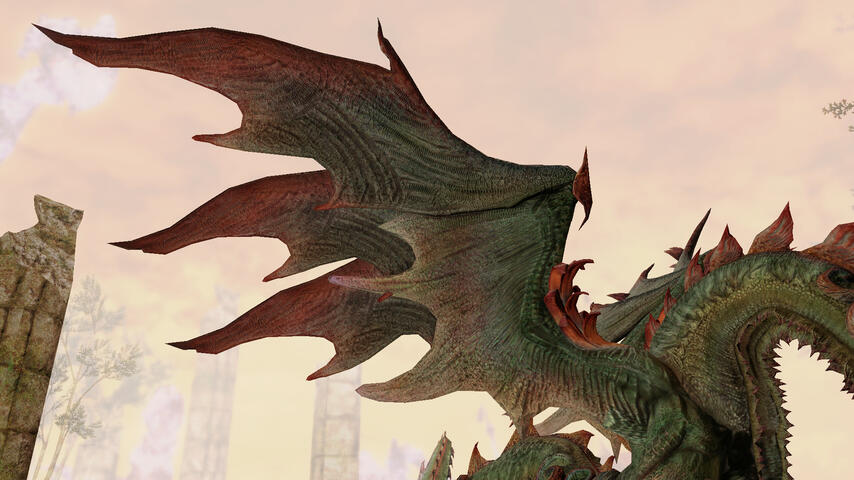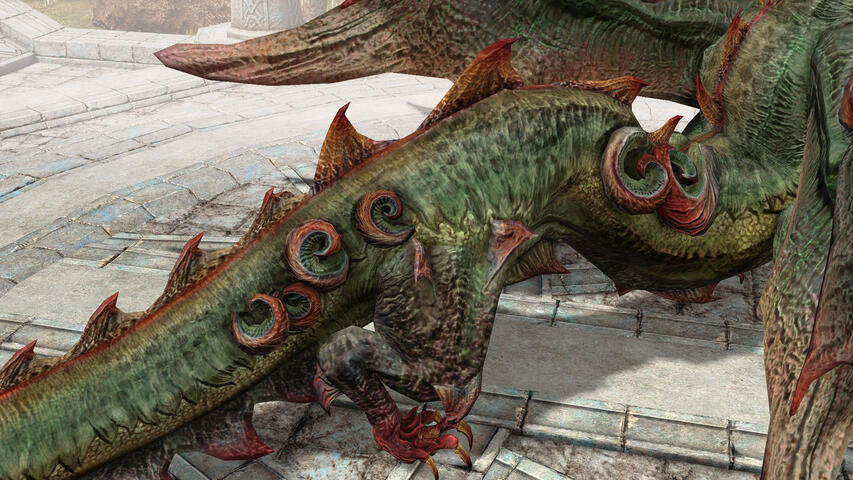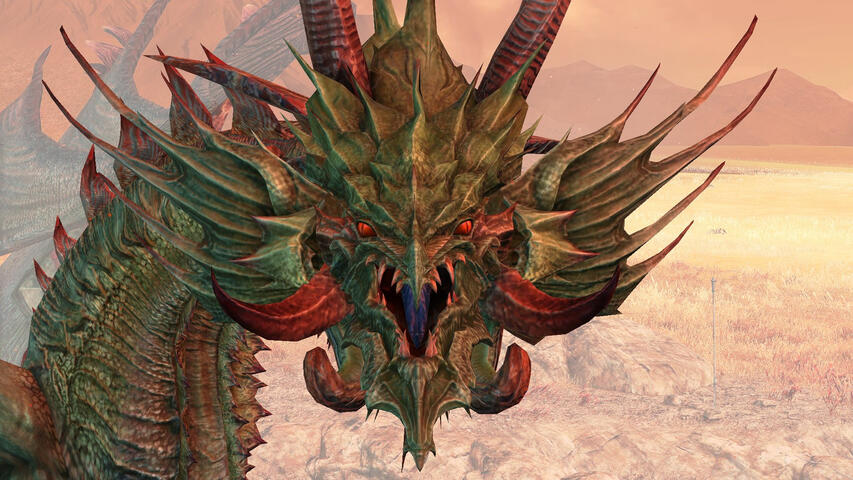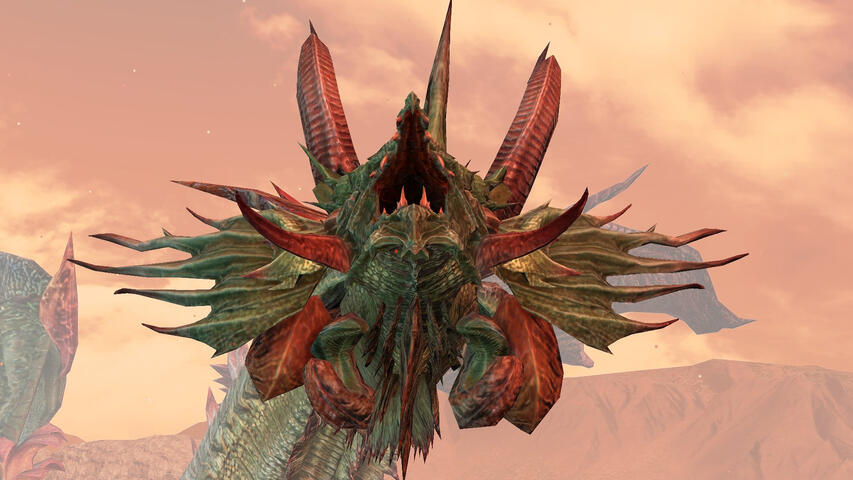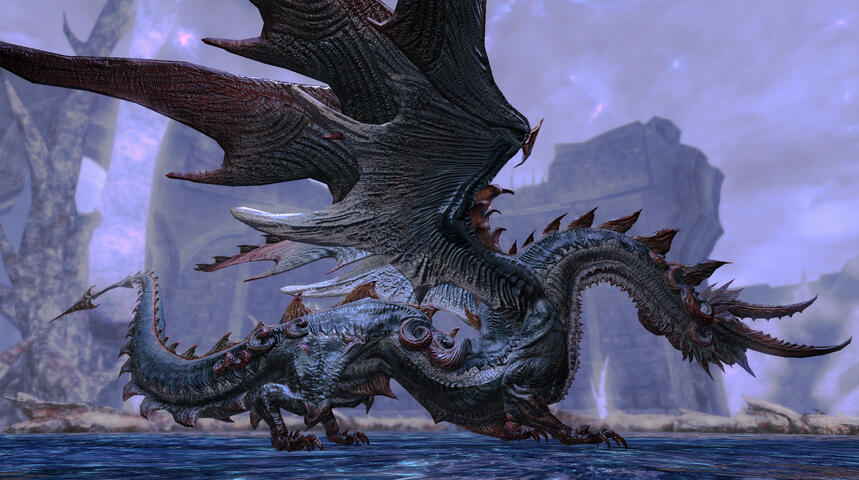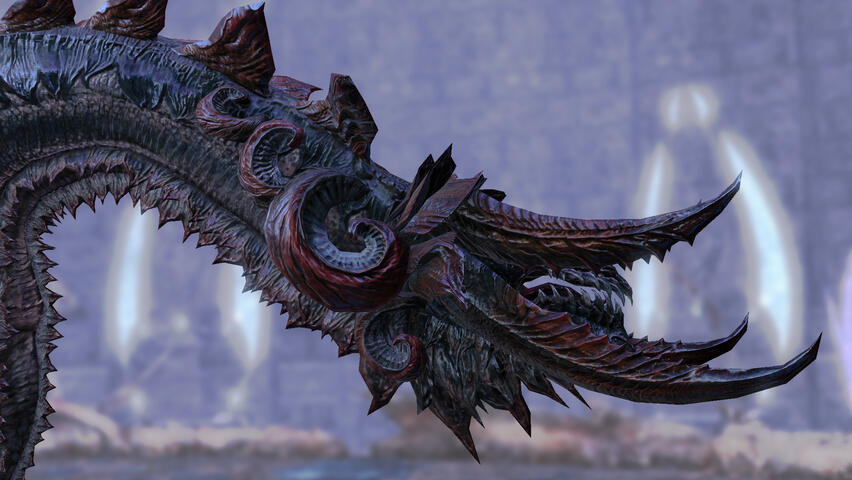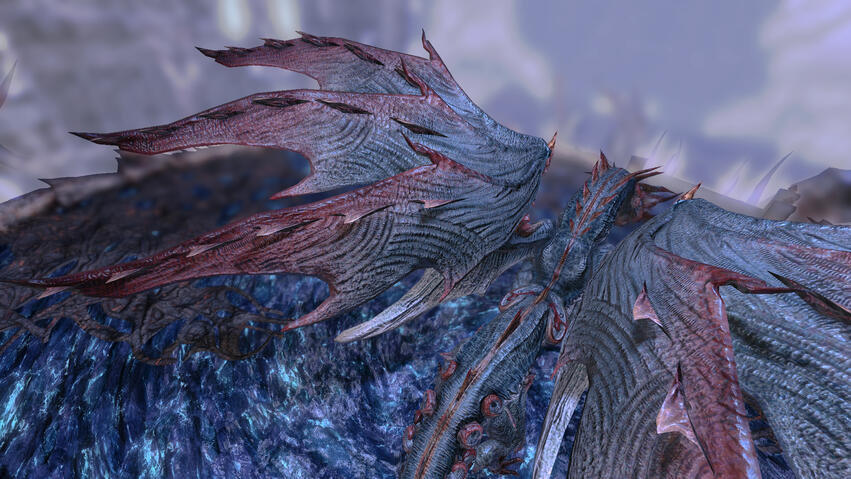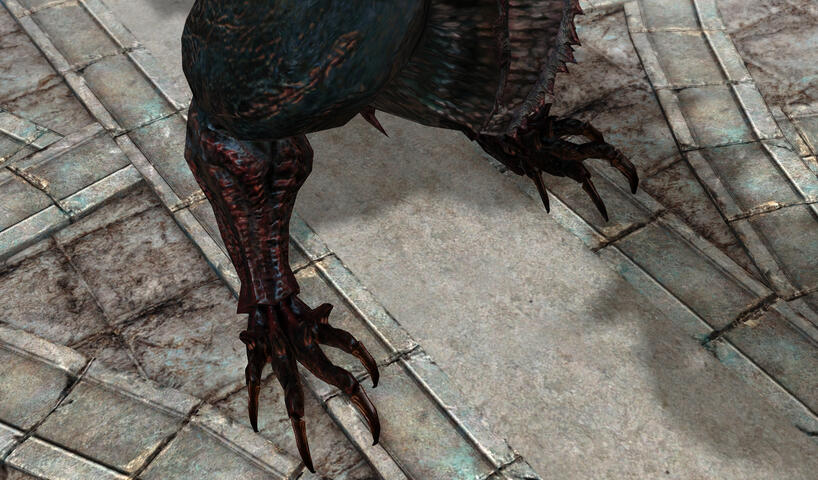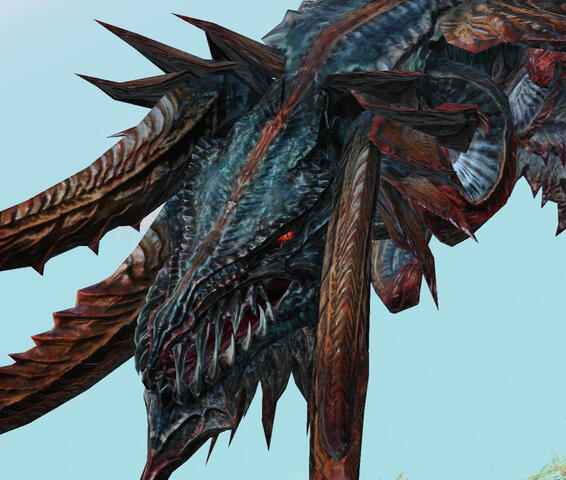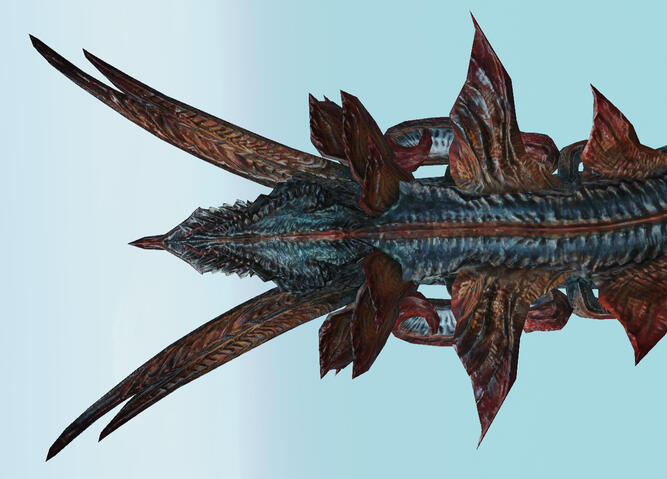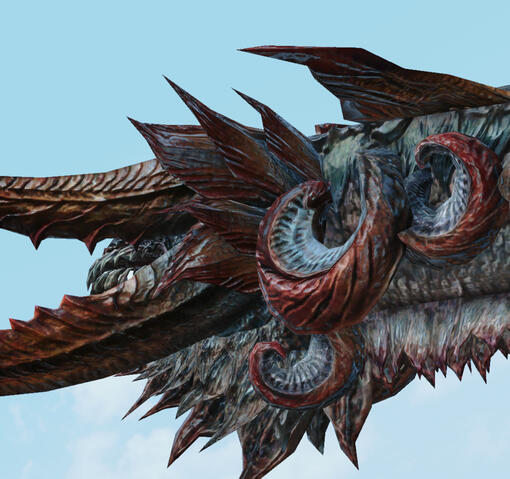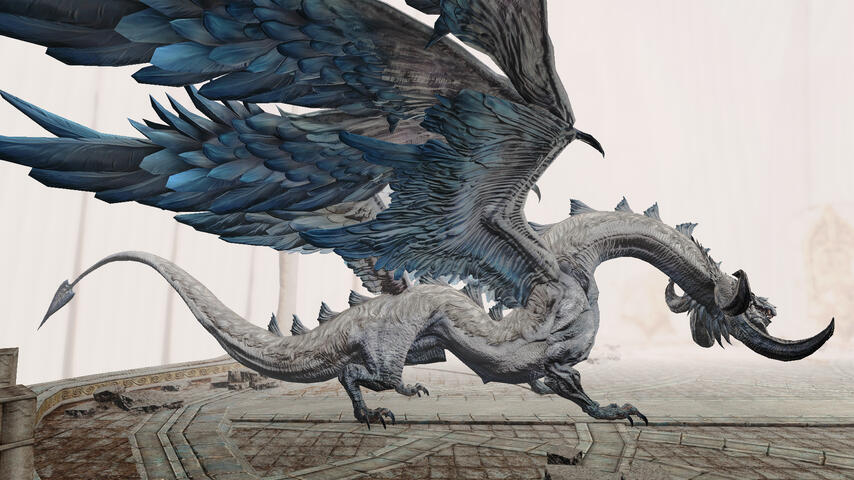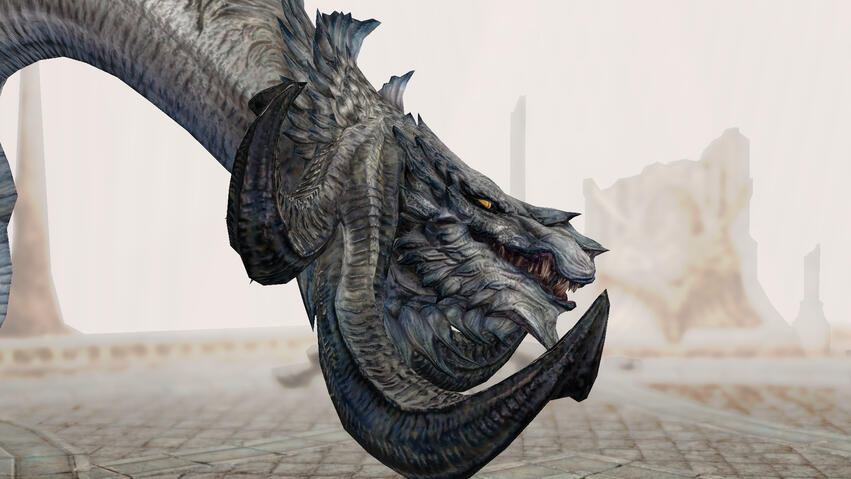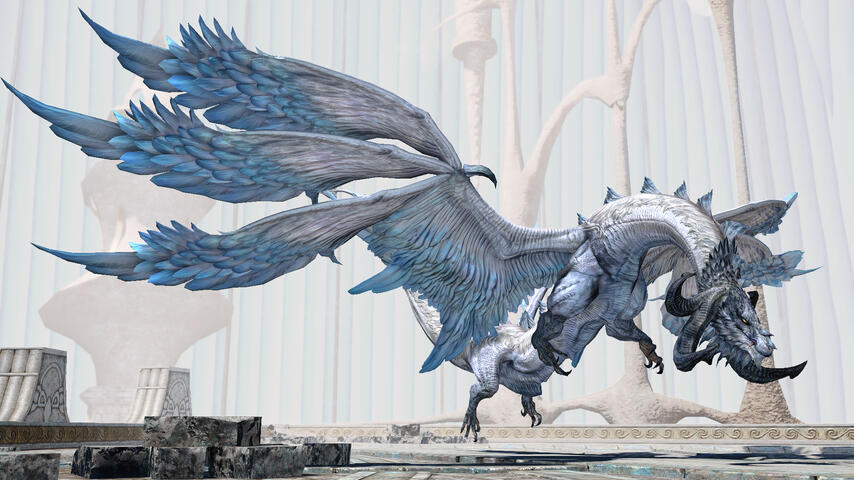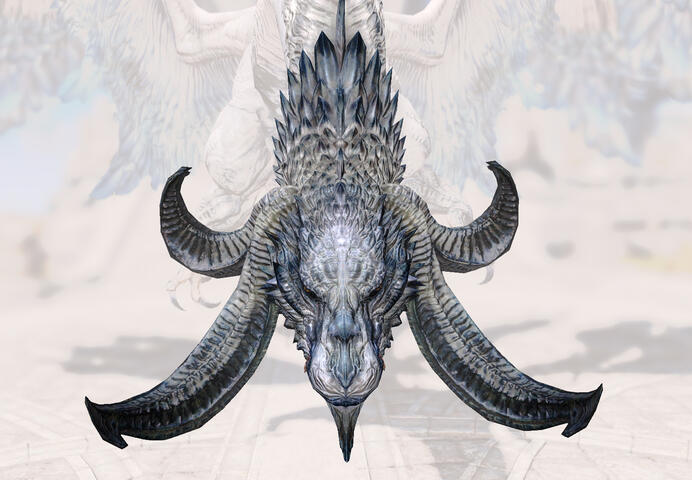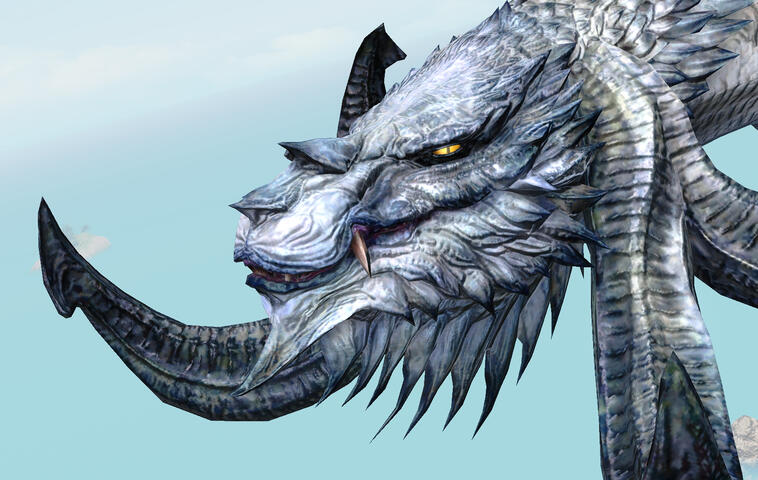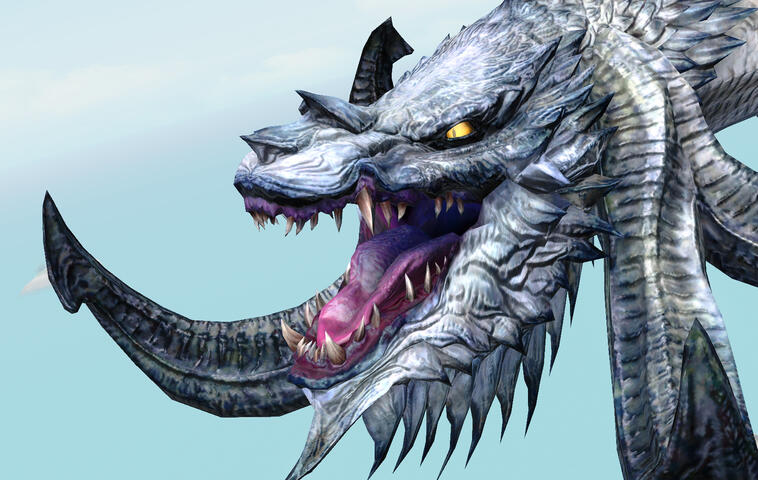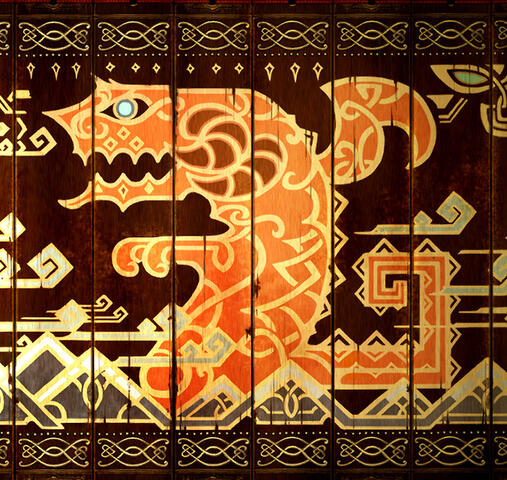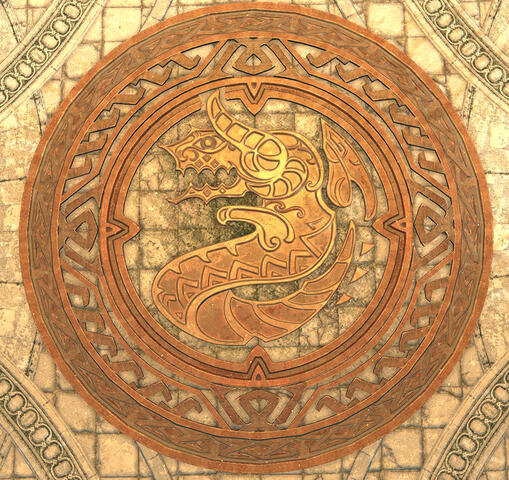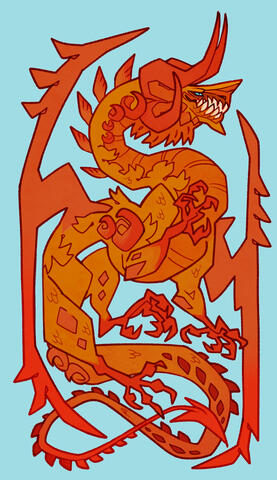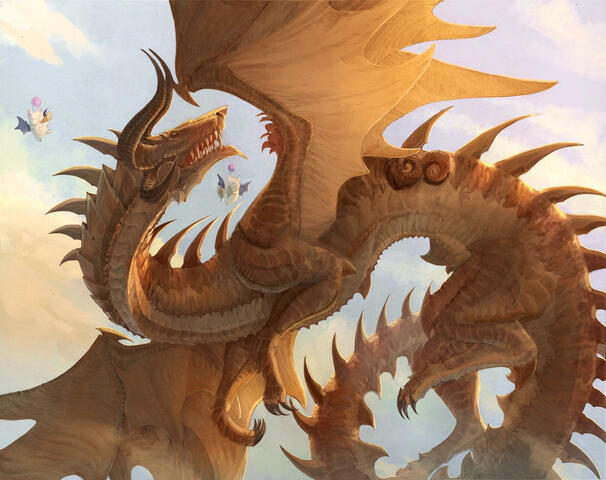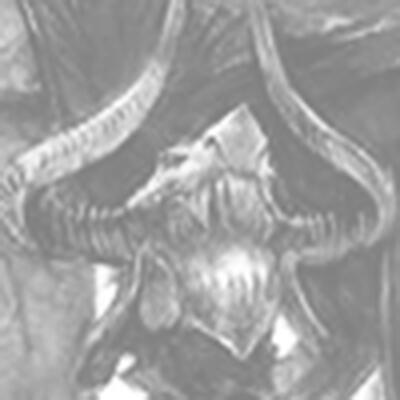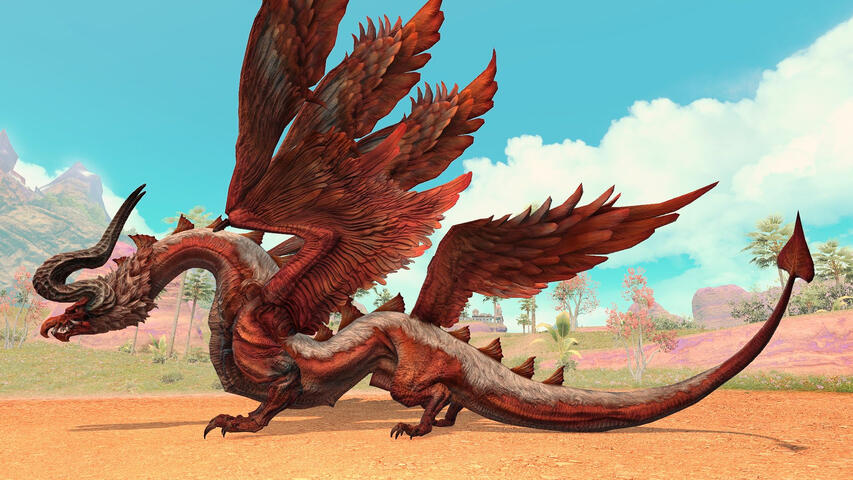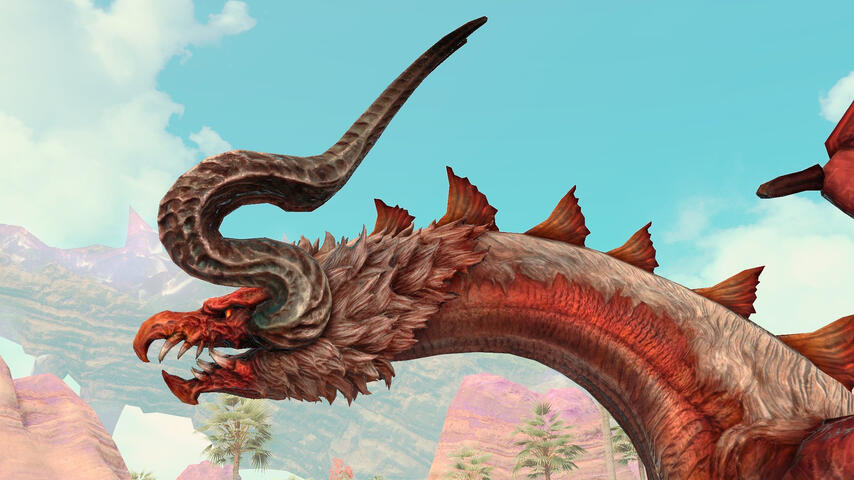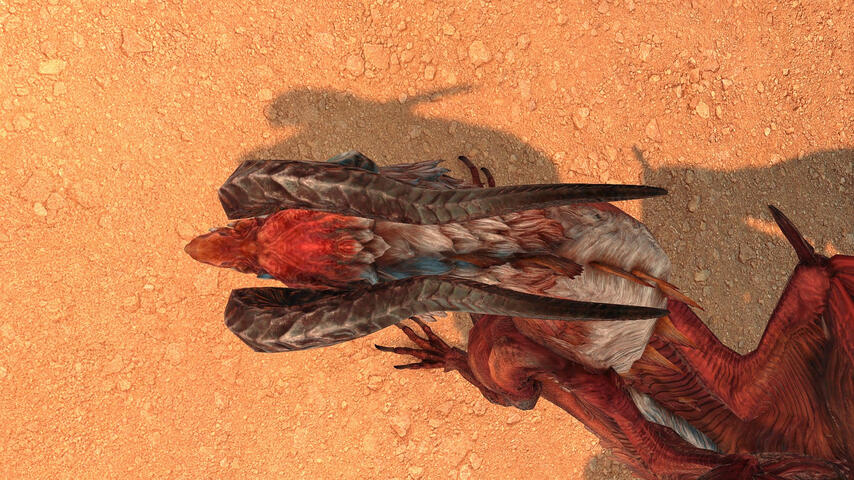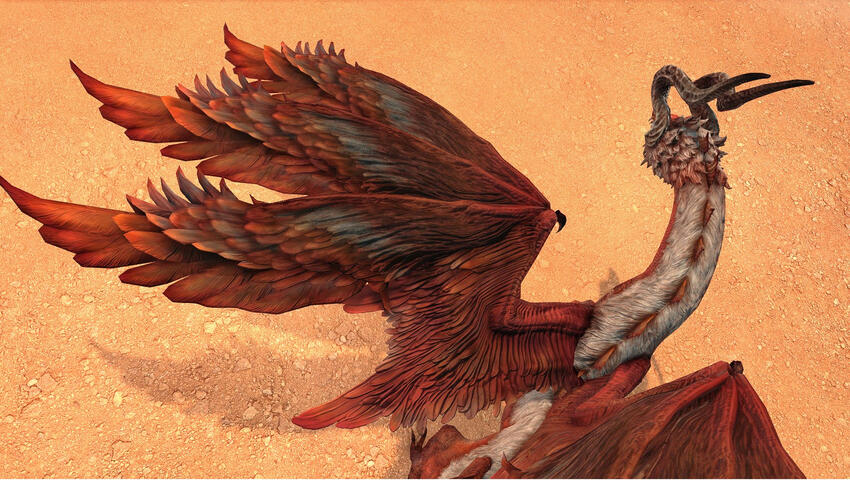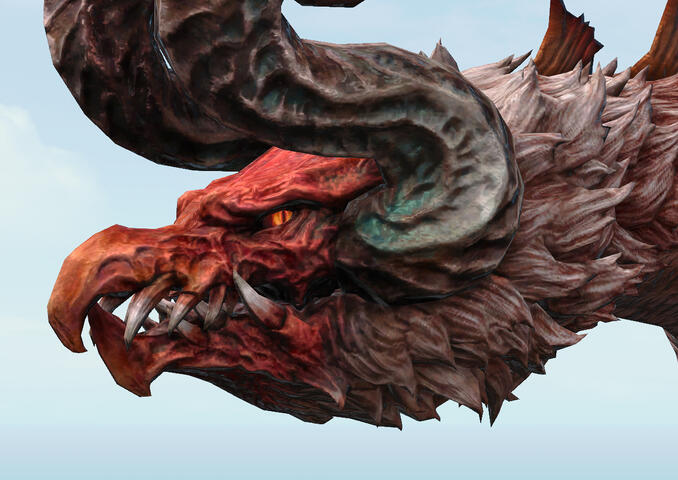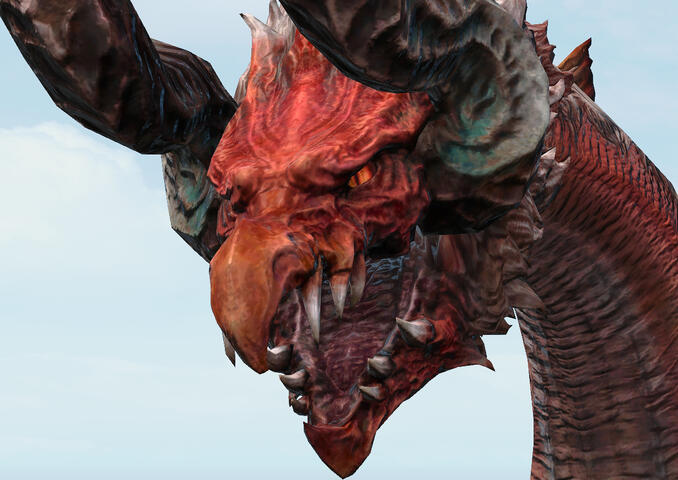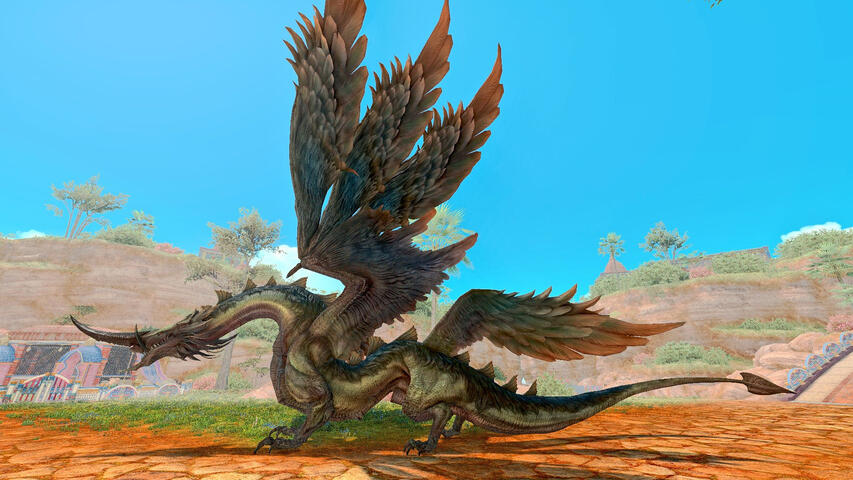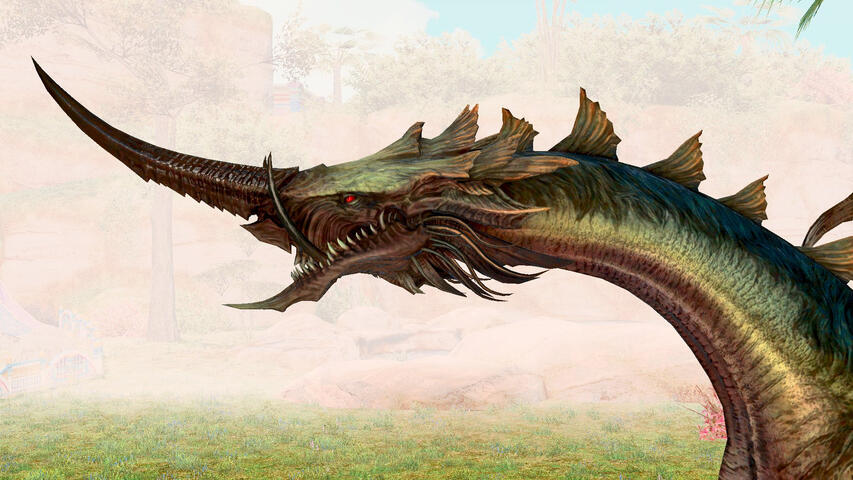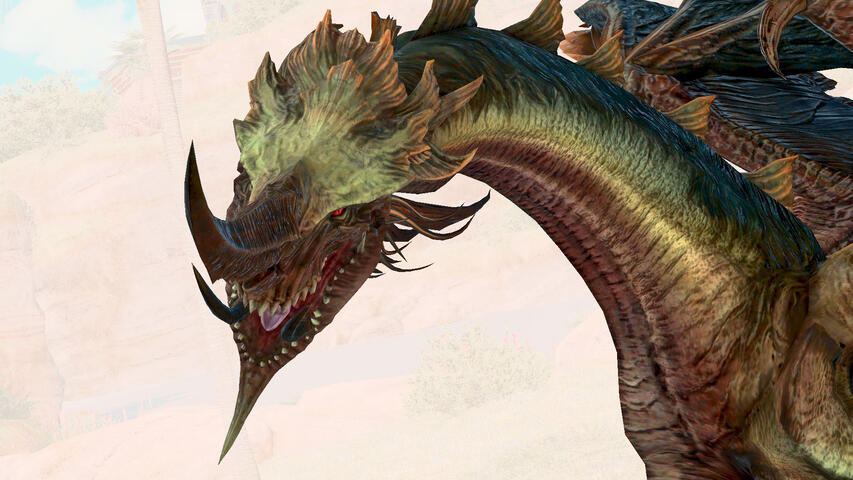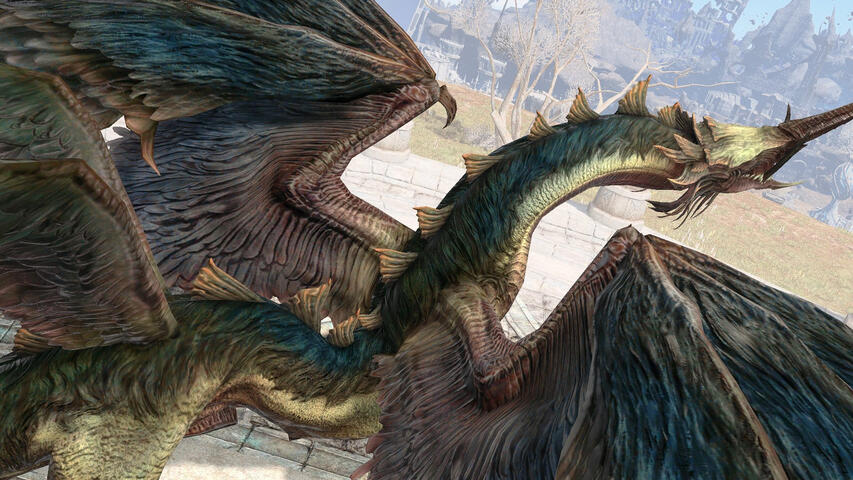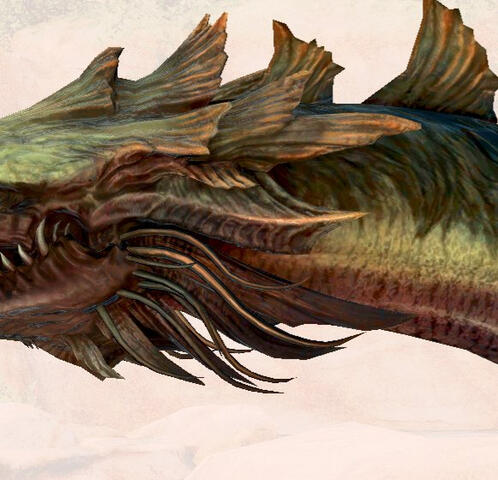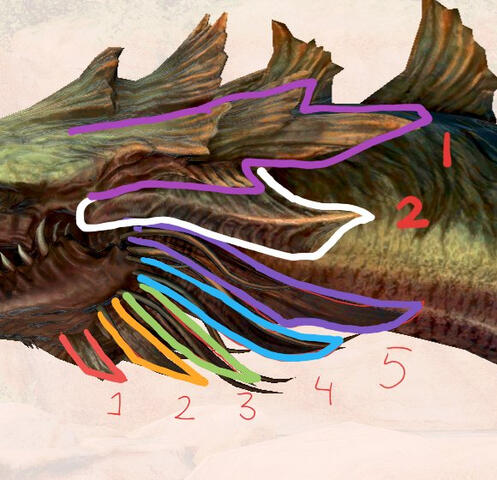
Tales from Dragonstar
Loskh na. Hess na. Leehs na.
A small collection of resources for the dragons of Etheirys, and of their ancestors from across the stars. This compendium is intended for all enthusiasts of the wyrms, and provide information for artists, role players, and general fans alike.
Spoiler Warning: Includes content up to current story (7.0)
The Wyrms
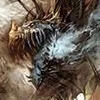
Midgardsormr
"Men die, and their children forget. But we are everlasting. To us, then is as now.
Thou canst not comprehend the violation. The outrage. The fury.."
-Midgardsormr, "At the End of our Hope", 3.0 MSQ
He is the father of all dragons upon Etheirys, and in his prime may well have been one of the strongest among his ancestral home of Dragonstar[1]. Fleeing across the sea of stars and feeding upon the aether of the worlds he passed by, he bore his seven eggs across the great distance with Omega in pursuit. When at last he came to Etheirys, he deemed it the 'last bastion of hope' for his near-extinct kind. Offering himself to Hydaelyn so that She may permit his kin to thrive here as their new home, he would exist as an ethereal form beyond life, and remain at her beck and call for whenever he was needed[2].Such a time came when Garlean forces sought to take control of Silvertear Lake—long believed to be a central wellspring of aetherial energy unto the realm. He appeared as a wyrm of indescribable size and accompanied by thousands of dragonkind, amassing over Mor Dhona to halt the fleet of airships. Midgardsormr pulled the largest of them from the sky—the Agrius—and the resulting explosion of aether and ceruleum from their mutual destruction marred the region, leaving little but towering crystals and bare rock. Both remain in the lake to this day, the wyrmking's remains still coiled around the ship after his sacrificial victory.During the events of 'A Realm Reborn', the Warrior of Light arrives to parley with the father of dragons. He awakens to the presence and issues a challenge to the intruding mortal, yet permits a short exchange of words upon recognizing Hydaelyn's blessing upon them. An agreement between Her and Midgardsormr leads him to accompanying the Warrior of Light on their Journey, in the form of a small dragonet vessel.As the sleeping guardian of Hydaelyn, he always has his mind turned to the star's fate and wellbeing. A deeply devoted individual as many dragons are, Hraesvelgr describes his love 'as boundless as the sea of stars', Midgardsormr forming a deep bond with the land that would become sanctuary to his kind. Caring and sympathetic primarily to his kin, complacent even in the events of the Dragonsong War, he does still value the deeds of the Warrior of Light and those who would work towards a peaceful future for Etheirys—in the distant and doomed timeline of the Eighth Umbral Calamity, after the Crystal Tower is sent to the past in another world, the remaining survivors are met by the wyrmking as he rises from slumber to guide them into a new era of rebuilding[3].
There is a potentially dramatic difference between how Midgardsormr is portrayed between the japanese and english versions of the cutscene following 'Keeper of the Lake'. Below are both versions, with credits to the japanese translation link. Note that extra care goes into translating to English to keep it consistent with the Old English style of speech, so it isn't so much an oversight as an intentional shift of tone that could not be conveyed in the original language.
ENG
"By Her gifts hast thou earned a moment's reprieve.
Speak, mortal, and I shall listen.
Guided by a star...? Heh heh heh.
My people have heard the song. Ishgard shall burn.
Sons must answer for their fathers' misdeeds.
We do not forget. We do not forgive.
Seven children did I sire. One now singeth of retribution.
I rise to join in the chorus.
Thou art powerless to silence us, mortal. Yet thou shalt not live to labor in vain. Thy reprieve is at an end.
Hmph. Trickery is thy shield. This frail, ignoble creature is not gifted, but chosen...
Hearken to me, Hydaelyn! I remember...and I consent.
Fear not, mortal... I shall not harm thee...
Heh heh heh. Mayhap thou thinkest me an oathbreaker?
Thou art mistaken. If thou comest to harm, it shall be by another's hand, not mine.
I did but strip thee of thy mistress's feeble blessing.
Thou didst profit much by Her grace, but no more.
...
The covenant binds me to thee.
I shall watch...listen...and wait.
Fight and struggle, if it be thy will.
Man hath ever coveted that which lieth beyond his grasp.
I drink of Her body, and thence doth mine own find new life.
When it hath grown whole, the loyal and penitent shall rejoice.
The Dragonsong heraldeth a beginning...and an end."
---
JP[4]
"So you too possess the Echo. That is why the phantom form cannot win over you.
In that case, it is Hydaelyn's will that we shall converse. Tell me, why are you here?
This is true, the star in the northern skies burns with the valorous roar of my kin. This is the battlecry, calling to advance.
Their destination is Ishgard, home of the people who have forgotten fear and have sinned.
This is retribution! The people of Ishgard are blind to their sins. Their sins demand battle without end.
And yet more, they want to sin again. This is why my kin roars.
You bid me to stop the war? You might possess the Echo, but you're just a human. I cannot grant such wish.
I have awoken to answer to the roar for it was not me who roared, but one of my seven sons.
As Ishgard doesn't want to repent, my child and their people will not delay the retribution. The land shall burn, their people shall die, the justice will be done.
This light... You protect him! Hydaelyn, you bestow more power on this one, who already bears the Echo!
Could it be, you think him special? Hydaelyn, you wish me to grant him power?
Very well. Then I shall test you!
The Dragonclaw has pierced you. By my power, it now locks away the blessing of light given by Hydaelyn.
Thus the light has also cast a shadow. Perhaps, even without my claw the light would grow dim one day.
I made a promise to Her. And so I shall not take your life.
However, you're a human. Like people of Ishgard, you're capable of a foolish crime. Do not think I spare your life for nothing.
...
This is my apparition, my avatar. From now on, it will go with you.
The avatar's eyes are my eyes. The avatar's ears are my ears. I will see what you can accomplish without the blessing of Light.
Make your destiny, special one. Break free from my claw with your own strength.
If you truly have special power, You can end the battle of judgement. This will be your trial.
My body will one day be reborn with the aether flowing in the land.
Overcome the trial then and bring the will of Light to people.
However, this will not be an easy path. Soon my kin will do battle with humanity. The roar of my children has already been heard in all of the land."
[1] 'In the Beginning, There Was Chaos' -Omega Quests. Omega relays information in a purely logical context, and implies that Midgardsormr at his prime was perhaps the strongest foe the Omicrons had ever faced. Enough that Omega pursued him across the Sea of Stars, and claimed him the nemesis of the Omicron star.[2] 'Return to the Rift' -Omega Quests. Much of Midgardsormr's backstory can be found in this series, including the circumstances of his unusual pseudo-primal state of existence.[3] 'An Unpromised Tomorrow' - Eighth entry from Tales from the Shadows.[4] 'Midgardsormr Japanese vs English' -Reddit thread with a comparison of English to Japanese texts, and a retranslation of the JP dialogue. Please note the author's comments, this is a strictly contextual translation and does not account for tone or style.
The First Brood
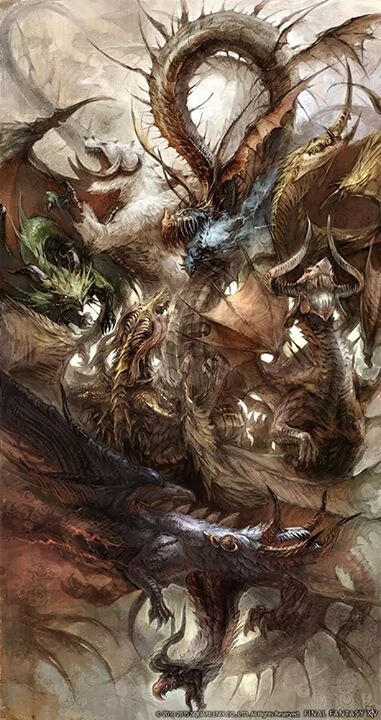
"In a time before time, did my father come to this star, bearing seven eggs.""From these eggs did my children hatch. And once they were full-grown, they took wing and spread across all the lands of Hydaelyn."
-Tiamat and Midgardsormr, "Fetters of Lament", 3.0 MSQ
They are the eldest of all wyrms on Etheirys, Midgardsormr's own brood that he escaped the dying Dragonstar with. With Hydaelyn's permission, they were granted refuge to live and grow upon Her lands. They would come to raise their own broods in time, scattering across the lands at their whims and having significant impact in shaping the cultures of those regions.Dragons have always been entangled in conflict, and the First Brood's history is a tragic one. Of the seven, only three still live, and a fourth's fate is still unknown. The remaining three perished at mankind's hands, and were tied to no small amount of suffering.The Great Wyrms are held with highest regards among their kind, both in respects and power. Their lifespan dwarfs that of their progeny, and the depth of their aether unrivaled. More potent still is the capacity of their roars to force a form of enthrallment upon their offspring and lesser kin—the Horde that terrorized Ishgard for over one thousand years is one such example.
So far, all of the First Brood can be divided into one of two body types—Thorned or Feathered.Both types are very similar anatomically, and tend to follow a very rough consistency of having a prominent and unique horn design (usually a set of two horns, but Vrtra and Azdaja break this pattern). All Great Wyrms (Midgardsormr excluded) have a unique wing anatomy compared to the rest of the dragons we meet in Etheirys, where the wing 'splits' at the wrist, into three 'fingers' (the features of which vary by body type).
Thorned Great Wyrms
'Scaled' bodies, though in-game models clearly depict a mane that grows along their backside, and the frills under their necks can be argued as either leathery or furred. Spiral horns grow from the sides of their necks, ribs, and base of the tail. Lines of spikes run down the length of their bodies, pointed forwards instead of backwards—these spikes are in two lines on the back of their necks, converging into a single line down to the tip of their tail, while two more lines of spikes follow the underside of the tail. Their wings split into spined, fin-like shapes and have lines of thorns across the backside.
Feathered Great Wyrms
'Furred' bodies, though they are no different from their Thorned counterparts in the fact their fur is only a mane running from head to tail. They are notable for having an extra set of wings on their haunches, just above their hips. A single line of backwards-facing spines runs down the length of their bodies (ending partway down their tails), and appear to be either leathery or feathered. Their wings split into feathered shapes with a single 'spur' on each, and a spur on the wrist. Their rear wings are also feathered, with no such handlike structure or spurs.
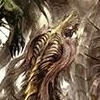
Bahamut
"Ere long, man fought man, blood was answered with blood, and none could see an end to the strife. Until, one day, they came to us.""Recognizing our wisdom, they entreated us to intercede in their conflicts. Bahamut agreed, and with him presiding over the affairs of men, the land knew peace once more."
-Tiamat, "For Vengeance", 5.5 MSQ
Current State: Deceased
Body Type: Unknown
Titles: The Dawn Wyrm; The Dreadwyrm
(Note - Bahamut as a primal is NOT the same design as he would have been when he was still alive. We currently don't have a clear image of what this might have looked like, so there is only speculation.)
Imagined/Fan Interpretations
If you have a fan interpretation you would like to lend to the gallery, please contact me from the Curator page!
Bahamut's Wish
Coming Soon: The mournful wish within bahamut's song, across thousands of years in imprisonment
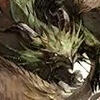
Tiamat
"Should you harken unto my call, we shall fly together once more. But should you not...I shall grant you peace.""Better to die than live as a tool of evil. You too would wish this, I know...And I shall do as I must."
-Tiamat, "For Vengeance", 5.5 MSQ
Current State: Alive (Meracydia)
Body Type: Thorned
Titles: The Dusk Wyrm
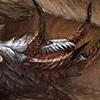
Nidhogg
"For a thousand years have I fought without cease—and thou didst think to prevail against me!""...But now I am whole, and naught in creation shall deny me my vengeance!"
-Nidhogg, "An End to the Song", 3.3 MSQ
Current State: Deceased
Body Type: Thorned
Closer Details
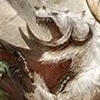
Hraesvelgr
"Abandon this war, shade. The suffering thou sowest serveth no end. The traitors' progeny have learned of their forefathers' betrayal, and seek now to make amends with our kind.""Never shall our grief be assuaged nor our loss forgotten, but reconciliation may yet halt the spread of this plague of enmity. Forsake thy vengeance and be at peace."
-Hraesvelgr, "An End to the Song", 3.3 MSQ
Current State: Alive (Dravania)
Body Type: Feathered
Closer Details
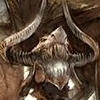
Ratatoskr
"Only the seven great wyrms were worthy of Nidhogg's attention. And among them, none but Ratatoskr truly understood him.""Her song was beautiful indeed, and she graced both dragon and man with her wisdom."
-Faunehm, "Gone But Not Forgiven", DRG 80 Quest
Current State: Deceased
Body Type: Unknown (likely Thorned)
(Note - We only have two canonical images of her, one from the First Brood painting, and one from the in-game artistic depictions. It's highly likely she was copper/orange/red with blue eyes.)
Imagined/Fan Interpretations
If you have a fan interpretation you would like to lend to the gallery, please contact me from the Curator page!
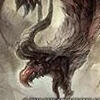
Azdaja
"...'elder sister' is the closest a mortal tongue can come to describing what she meant to me.""I was the last of our brood to hatch, and Azdaja cared for me where my sire could not."
-Vrtra, "A Brother's Grief", 6.1 MSQ
Current State: Unknown (The Void)
Body Type: Feathered
Closer Details
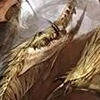
Vrtra
"Even cowering behind my curtain, I know the suffering of the powerful. I have watched my siblings driven mad by loss.""Thus do I exhort thee to spare no effort to keep thy loved ones safe."
-Vrtra, "The Jewel of Thavnair", 6.0 MSQ
Current State: Alive (Thavnair)
Body Type: Feathered
Titles: The Satrap of Radz-at-Han
Closer Details
Lesser Dragons
There are many dragons that can be met in game, so not every minor npc may be listed here.
Hraesvelgr's Brood
Vidofnir
Vedrfolnir
Orn Khai
Ohl Deeh & Whei Ahf
Fjalar
Galar
Nidhogg's Brood
Vishap
Tioman
Faunehm
Aiatar
Isgebind
Svara
Safat
Darkscale
Rastaban
Etamin
Ratatoskr's Brood
Ehll Tou
Gullinbursti
Fylgja
Bahamut's Brood
Twintania
Imdugud
Memories of Dragonstar
Most of the dragons found in and around Reah Tahra are no longer 'individuals'...rather, not yet. They remain, memories of a dead star coalesced into conscious entities. While these NPCs don't generally have much to note, they are listed to give some insight to their names—many are 'named' by their purpose when met by the Warrior of Light, rather than a proper name to refer to them as an individual.Al End - 'Promise End' (Can be read as 'Promised End', or even 'Final Promise'), the dragon that was the seed of despair for the Dragonstar region of Ultima Thule.
Fohl Oloh - 'Fly Follow'
Kohl Ahleh - 'Go Know'
Kohm Noskh - 'Come Ask'
Sehth Toskh - 'Give Answer'
Seih Loskh - 'Stay Listen'
Whei Fehsk - 'Wait Return'
Oskh Rhei - 'Speak Pray', one of the Ultima Thule hunt marks, a dragon that has been warped with Omicron augmentation.Some Ultima Thule NPCs are missing because parts of their names are not yet confirmed by the official dictionary
Other Dragonshape Entities
Scalekin
Dahak
Provenance Watcher
Shinryu
Draco/Monitor
Gwiber
Landerwaffe
Dragonspeak
The ancestral language of dragons is one of a spoken word rather than written text, the words serving as 'a supplementary shell that contains the telepathic projection of their thoughts and desires'[1].A language that changes little and takes significant time to master its finer subtleties, truly only upheld by the older dragons and Great Wyrms. Its nature is one of efficiency, and would be baffling to a first-time conversation partner as they try to navigate speech that has condensed grammar, combined definitions, and relied upon one's very tone of breath to convey intent...all in the favor of speaking as little as possible. The shorter lifespans of later broods mean that it's a difficult task for younger dragons to learn—let alone curious individuals of other races.The written records of how Dragonspeak works are split below into two categories: "A Lesson in Dragonspeak" and "Dragonspeak Dictionary", both are sourced from the original forum posts made by the language's designer, Koji Fox. To date, this is the only canonical information we've received on the topic, and as such will be pasted into each respective tab as-is from the original forum posts.A third page is designated for my own additional notes, such as naming conventions and some in-game translations to help illustrate the syntax.
[1] 'Encyclopedia Eorzea, Vol. 1' — Pg. 269
(The following is directly quoted by language creator Koji Fox, aka Fernehalwes on the Square Enix Forums. A link to this forum post can be found here. )
An OverviewIf I were to describe dragonspeak in one word, it would be “economical”. The dragons (more specifically, the First Brood) have had tens of thousands of years to trim the fat—whether it be from vocabulary, grammar, syntax, or even pronunciation. Multiple meanings have been consolidated into single terms and redundancies eliminated. Words have been shortened, simplified, or condensed to minimize oratory exertion. Instead of differences in meaning being represented by different words, inflection and breath patterns have become the norm. And then there is the simple fact that the beings who use this language have been doing so with the same partners for thousands of years. It is only expected that after communicating with someone for so long, that both parties are, in an sense, able to anticipate what the other will say, further contributing to the abbreviation or omission of obsolete terms, as well as imparting even deeper meaning to words NOT spoken─the ultimate form of reading between the lines.Languages such as English change over time as millions of people use and refine it in their everyday lives. Those people eventually die after a few decades, and the next generation takes up the process of changing the language, moving it in directions the previous generation may not have even imagined. How many people living in the 19th century would have believed that the word sh*t would come to mean something “great” or “outstanding,” simply by adding the definite article? The path the dragon language takes, however, is largely dictated by the dragons of the First Brood. These select few don’t die after a few decades, and while the language is passed down to their progeny, it is ultimately used to speak with the parents─parents who change little themselves. The result is a paradox in the sense that you have a language that exists in a form that can only be mastered by someone who has been exposed to it for thousands of years...making it difficult for any younger dragons to pick it up themselves, coupled with the unfortunate fact that the lifespan of the latter broods, while still significant, pales in comparison to that of the First.Dragons Naturally SoundingDespite their high level of intelligence, the dragons do not have a written language. This means that all written forms of the language are transliterations based on Eorzean (English). While our alphabet can be used to represent most sounds of the dragon tongue, there are some tricky ones that range from quirky to down-right impossible for non-dragons to pronounce. Let’s first start off with two of the most important: [n] and [h].One of the most basic and unique features of the language is the presence/absence of [life] in words. To the dragons, most words (with some exceptions, of course) represent either a concept that contains or is void of life. Words that are deemed to contain life, such as ‘dragon,’ ‘person,’ and ‘flesh’, will almost always contain a bass-heavy nasal N sound somewhere in them, whereas words without life, such as ‘escape,’ ‘sleep,’ and ‘see’, will always contain what can be best described as a wispy/breathy sound similar to lightly clearing ones throat, but without the...er, juiciness, for lack of a better term. The former is represented in transcribed dragonspeak with an [n], the latter with an [h], to distinguish them from normal ‘n’ and ‘h’ sounds.Dragon - dra[n]
Person - arr[n]
Flesh - [n]eshEscape - e[h]sk
Sleep - so[h]m
See - [h]essWhat dragons consider to be ‘life’ is not always as clear cut as ‘living being’ vs ‘inanimate object.’ For example, the word for death, mor[n], contains the life-representing [n]. While to us, death represents the absence of life, the dragons look at it as a part of life—something that would not exist without life—and therefore add that [n]. Another example is [n]oskh, or the word for ‘to ask.’ The dragons believe that life is a journey to search for the reason for existence, and that questions are what bring them closer to that goal. For the dragons, to question is to live. On the other hand, the word for sun, ‘soo[h],’ does not contain an [n] despite being something that is considered by many cultures necessary for the cultivation of life. This is because the dragons─those of the First Brood, at least─understand that the sun is, scientifically speaking, a ball of radioactive plasma floating in the void of space…and have known this fact for a long, long time.Three additional examples of unique consonants are:sj sja[h]s (vengeance)
As the transliteration implies, it is a cross between an “s” and a “j”, but in fact it is a bit more complex, containing s+sh+ch+d+j all combined into a rumbling, buzzing compound that, despite containing so many sounds, is spoken at the same speed as a simpler consonant.ft fta[h]r (after/later)
Another seemingly simple compound sound that is actually quite complex—the “t” sound not being a full stop, but breathed through, placing it somewhere between “t” and “th.”y dy[h]r (differ/different)
One must be careful not to pronounce this as “ee,” as that may change the meaning of the word. “Y” is actually closer to a “ye” sound, but without the “y” sound being as prominent. The “Y” is effectively swallowed as it segues into the “e,” leaving the listener with something that is clouded at the beginning, but eventually resolves in a long vowel.I mentioned earlier how inflection and intonation plays a role in the language. These intricacies are transliterated via dots (glottal stops), shapes (rumbling), curved lines (pitch changes), and other types of flourishes (fluttering) above and below the written words. This cannot be reproduced by any of Microsoft’s pre-installed fonts, so I’ve included a picture of some handwritten script.There is one more very unique sound that plays a prominent role in the dragon tongue, but as it deals directly with tense, I’ve saved it for the next section, which has to do with basic vocab and grammar.Dragons Naturally SpeakingThe basic structure of a sentence is Verb - Object - Subject (as opposed to English which is Subject - Verb - Object). In other words, where in English we would say"The wombat ate the Lalafell"the dragons would say"Ate Lalafell Wombat."This exhibits how important action is to the dragons as opposed to the initiator of that action. Who ate the Lalafell is (relatively) unimportant. Immediately recognizing that “eating” has occurred readies the dragon to decide on an appropriate action in response.Speaking of sentence subjects, whereas English employs several types of pronouns, dragonspeak has only the following three:1st person = a[n] (covers: we and I)
2nd & 3rd person = i[n] (covers you, he, she, they)
3rd person inanimate = a[h] (covers it, that, this, those)Again, everything has been simplified down to focus on whether or not the action was initiated by the dragons or someone else (a distinction here being made between animate and inanimate things via the inclusion of [n] and [h]).Adjectives and adverbs will almost always come after the word that they modify, again placing the importance on the action or the object of that action over the words that describe them. The sentence[slowly ate] {the foolish Lalafell.}would be constructed in dragonspeak as[Ate slowly] {Lalafell foolish}You may notice the lack of articles in the dragonspeak rendition. This is because dragons no longer employ the articles a, an, or the, having come to view them as superfluous and bringing little to a sentence in the way of relevant meaning.The one slight deviation from modifier order is when a possessive is used. Instead of after the noun, it will come before (as it does in English, but without an apostrophe s).Thordan’s vengeance - Thor[n] sja[h]sPossessive pronouns are no different from the pronouns listed above:My/Our vengeance - a[n] sja[h]s
Your/His/Her/Their vengeance - i[n] sja[h]s
Its vengeance - a[h] sja[h]sThere is next to no conjugation of verbs in dragonspeak─another sign of extreme efficiency. Where in English we have different forms to indicate past or present tense, as well as a compound structure to communicate future tense, dragons use the same word for all three─the only difference being the inhaling of breath while saying the verb to indicate future.For example, the base word for ‘eat’ in dragonspeak is ee[h]s:Eat - ee[h]s
Ate - ee[h]s
Will Eat - [s]ee[h]sThe first two are spoken while breathing out, and pronounced like “east” minus the “t,” with the middle of the word heavily aspirated (like the slight soughing of an autumn wind through slowly decaying leaves, or the raspy sigh of an octogenarian’s last breath). The latter is spoken while breathing in─an action that, when performed by a dragon, creates a slight hissing sound that attaches itself to the front of the word. This is represented by [s] when transliterating.So why is there seemingly no linguistic difference between past and present tense? The reasoning behind this decision lies in how dragons view time and causality. The dragons believe that the present is a culmination of everything that has occurred in the past, essentially making the two one in the same. To put it simply, when one has lived tens of thousands of years, what is happening now is indistinguishable from something that has happened before.Other verb forms such as present progressive and present perfect also fall under the past/present rules:Is Eating - ee[h]s (a)
Have Eaten - ee[h]s (for[h])The key here is the words that accompany ee[h]s. “A” (pronounced like a quick ‘ah’) is the dragonspeak equivalent for “now/in the present.” Using this in conjunction with a verb emphasizes the progressive nature of the verb. “For[h]” is the dragonspeak equivalent for “not now,” and when used with a verb not in the future tense, it can emphasize the fact that something happened at a time not now, but not in the future. Again, as dragons treat past and present as interchangeable, these“forms” are rarely used, and when they are, it is done more so for emphasis rather than the need to make it clear that the dragon is talking about the past or the present as opposed to something else.Negative sentences are created in a fairly simple manner—by adding an “n” to the front of a verb. This n is different from the life-indicating [n] in that it does not contain the nasal droning. It is a simple, short, hard “n” sound.nee[h]s fou[n] a[n] - We don’t eat chicken.One thing that I mentioned in the opening was about how individual words took on more ‘meanings’ through a process of consolidation. A major example of this is how a single word can be used as a noun, adjective, verb, and so forth.For example, in English, we haveCorrupt (verb) - Corruption (noun) - Corrupted (adjective)In dragonspeak, however, all of these words are consolidated into “te[n],” dragons being able to understand which meaning the word takes by determining its position in the sentence in relation to other words. Here is an example of how that works:te[n] le[h]s Thor[n] - Thordan corrupted the land.
[s]to[h]m te[n] Thor[n] - Thordan will bring corruption.
[n] err[n] te[n] Thor[n] - Thordan is a corrupted man.There is still much more to the language, but short of writing a complete textbook on the subject, it’s looking like it will be impossible to relay all the intricacies without having to quit my day job, so I’m going to stop here.OR AM I?Before I wrap things up, I wanted to talk a little about how the language is used in the game and how it contributes to game lore, and to that end I’ve compiled a list of "funfacts" for your enjoyment:Funfact 1:Astute observers may have already picked up on the fact that some dragonspeak words appear similar to their Eorzean (English) counterparts. Perhaps these similarities to Eorzean suggest that Eorzean languages may have a root in dragonspeak...!? Some examples include:come = ko[h]m
new = nuu[h]
anger/hate = ga[h]rFunfact 2:An interesting example can be found in the Dravanian forelands. Unlike the Churning Mists, where place names are rendered in dragonspeak because only dragons (and the occasional moogle) reside there, there are quite a lot of Eorzean (English) names on the forelands map, despite being Dravanian lands occupied primarily by dragons for thousands of years. The truth of the matter is that most of these locations DO have dragonspeak names, but the early Eorzeans who settled there misheard the dragon names (which were too complex for them) and instead gave them similar-sounding en equivalents.The easiest one is Mourn─a corruption of 'mor[n]', meaning 'death', which is the entrance to Sohm Al (promised slumber), where dragons go to end their overlong lives and get some deserved sleep.Other examples include:The Whilom River -> wa[h]r a[h]lm (calm water)
Mare’s Oath -> ma[h]r ro[h]s (summer woken)
Halo -> w[h]ei lo[h]s (the path to loneliness)Funfact 3:There also happens to be one place on the Azys Lla map that features a name in the dragon language. One may ask how this is possible, as it goes completely against the naming conventions used for other locations in the area. Well, the story behind this is that the name is, in fact, an Allagan creation, not something that the dragons themselves coined. At the height of their civilization, the Allagans felt that they had achieved intellectual supremacy over all other beings on Hydaelyn, the mighty dragons included. Even the dragon language, once believed impossible to crack, was fully deciphered by Allagan linguists─or so they claimed. Using the ‘impossible’ language became a fad, and dragonspeak was, for a time, incorporated everywhere from restaurant names to cereal brands. The claw-like formation in the Delta Quadrant—Esh Thom—is an attempt by an Allagan to make a play on the dragonspeak word for god “es[h]e[h]d,” which is, in fact, a compound meaning “highest spirit.” The Allagan who coined the term took the e[h]d portion (highest) and replaced it with “t[h]om” (bottom-most), possibly to express the late Allagan civilization’s departure from matters theological and their disdain for those who still adhered to their belief in an almighty being watching over them. It turns out that the joke was on the Allagans, as not only did a planet-wide calamity put an end to their reign over Hydaelyn, but the name Esh Thom does not translate into “the lowest of spirits,” but more closely to “an underdeveloped spirit,” a trait which can possibly be attributed to the fall of their people.Funfact 4:So, how is the translation of dragonspeak lines actually handled? The flow is a tad unorthodox, but basically...1. The Japanese is submitted by the scenario team.
2. The English translation is done, prepping it for dragonspeak by cutting the fat and reducing it to its core meaning (using the economization techniques mentioned above). If that core meaning is not clear, we'll often work directly with the writer to determine the most important portions of the message to ensure we are not omitting anything that the writer wishes to remain.
3. I, personally, do the dragonspeak translation. If I am ever unable to perform my duties as dragonspeak translator...then I suppose the dragons would stop talking.
4. The dragonspeak is reviewed by the original English translator and the English is adjusted if necessary.
5. I do a simple recording of the lines for the voice actors (as some of the lines subtleties/pronounciation) cannot be relayed via written text.
6. Voice recording is done by the English voice actors (for use in all language versions)
7. Effects are added by the sound team.
(The following is directly quoted by language creator Koji Fox, aka Fernehalwes on the Square Enix Forums. A link to this forum post can be found here. )
Verbs
| English | Dragonspeak |
|---|---|
| answer | tosk[h] |
| ask | [n]oskh |
| be | [n] |
| bring | to[h]m |
| call | o[h]l |
| change | e[h]skdy[h]r |
| come | ko[h]m |
| curse | k[h]ur |
| decide/intend/choose | sai[h] |
| die | mor[n] |
| differ | dy[h]r |
| disturb/destroy | dys[h] |
| eat | ee[h]s |
| escape | e[h]sk |
| fall/drop | fa[h]l |
| fight/war | wor[h] |
| fly | fo[h]l |
| follow | olo[h] |
| force/drive/push | oos[h] |
| gaze/witness/see | [h]ess |
| get/receive/hold | seet[h] |
| give up/surrender/sacrifice | ee[h]l |
| give/inflict | se[h]th |
| go | ko[h]l |
| happen/occur/befall | [h]aff |
| have | a[h]l |
| hide | an[h]ess |
| kill | e[h]k mor[n] |
| know | ahle[h] |
| leave/discard/forget | do[h] |
| lie | eil[n] |
| listen/hear/learn | losk[h] |
| make liquid | e[h]k |
| mix | kis[h] |
| must/need | [s]ma[h] |
| pillage/steal | e[h]sk y a[n] |
| point/face | f[h]ei |
| pray | r[h]ei |
| presume/believe/think/plan | lee[h]s |
| regret | k[h]ash |
| render/make/turn | e[h]sk |
| return | fe[h]sk |
| revive | [n]ehsk |
| seek | ko[h]l [h]ess |
| shake | sha[h] |
| sleep | so[h]m |
| speak | osk[h] |
| stand | ta[h]n |
| stay | sei[h] |
| tie/bind | ta[h]i |
| tire | so[h] |
| use/wield | oo[h]s |
| wait | w[h]ei |
| wake | ro[h]s |
Nouns
| English | Dragonspeak |
|---|---|
| age/time | a[h]im |
| Allag | Ala[n] |
| anger/hate | ga[h]r |
| apology | so[h]r |
| army | sor[n] |
| ascian | as[h]a[n] |
| beast (wild beast) | [n]eest |
| betrayal | eil[n] |
| blood | loo[n] |
| bone | ohl |
| bottom | t[h]om |
| chicken/bird | fou[n] |
| circle/fate | ak[h] |
| crystal | t[h]arl |
| death | mor[n] |
| doing | do |
| dragon | dra[n] |
| dragoon | dra[h]or[h] |
| dream | [h]ess y so[h]m |
| egg | for[h][n]esh |
| Elezen | [N]ell |
| end | e[n]d |
| extinction | alamor[n] |
| eye | [h]ess[n]esh |
| fire | fa[n] |
| firmament/sky/heavens | we[h]s |
| flesh | [n]esh |
| god | es[h] e[h]d |
| gold | go[h]l |
| hand | ei[n] |
| holy see | [n]ishka |
| Ishgard | [n]ish |
| journey | nee[h] |
| kin | ki[n] |
| knowledge | ohle[h] |
| land/Hydaelyn | le[h]s |
| leader | [n]ehd |
| loneliness/madness | lo[h]s |
| love | e[h]sk |
| man | err[n] |
| Meracydia | mera[h] |
| method/way | w[h]ei |
| moon | mo[h] |
| name | e[h]m |
| pain | a[n]g |
| peace | ((missing)) |
| person | arr[n] |
| piece | ee[h]s |
| power/strength | stra[h] |
| punishment | scor[h] |
| redemption | asa[h] |
| root/center | oo[h]r |
| savior | [n]arr |
| Shiva | Shee[n] |
| sin | si[n] |
| sleep/slumber/calm | so[h]m |
| song | a[h]m |
| spirit | es[h] |
| start | sta[h]r |
| steel/blade | l[h]ei |
| storm | stoh |
| summer | ma[h]r |
| sun | soo[h] |
| Thordan | Thor[n] |
| top/first | e[h]d |
| tree | gro[n] |
| truth | s[h]is |
| vengance | sja[h]s |
| wall/shield/conviction | s[h]all |
| want/desire | wa[n] |
| water | wa[h] |
| will | es[h] y [n]esh |
| woman | herr[n] |
Adjectives
| English | Dragonspeak |
|---|---|
| after/later | fta[h]r |
| again | k[h]ei |
| ancient | fa[h] |
| arrogant | gah[n] |
| not now | for[h] |
| blind | an[h]ess |
| born | or[n] |
| calm | a[h]lm |
| confused | koo[h] |
| corrupted/rotten | te[n] |
| covered | k[h]ad |
| deep | dee[h] |
| during | fee[h]r |
| eager/zealous | e[h]ll |
| easy | ee[h]z |
| empty/hole/alone | e[h]s |
| enchanted | tar[h] |
| eternal | afa[h] |
| few | yuu[h] |
| final | f[h]ail |
| good | oo[h]d |
| greedy | war[n] |
| half | a[h]f |
| high/up | ai[h] |
| inside | dai[h] |
| large/great/many | la[h]r |
| light | lye |
| little/weak | my[h]k |
| lost/forsaken | no[n] |
| low/down | lo[h] |
| new | nuu[h] |
| promised | al |
| quiet | le[n]s |
| red | rhe |
| right | ais |
| sad | k[h]ai |
| slow | so[h]l |
| strong | ong |
| stupid/foolish/young | ya[h] |
| too/beyond | tou |
| wicked/treacherous | eil |
| wrong | nais |
Modifiers
| English | Dragonspeak | Notes |
|---|---|---|
| negative | n/no | If the verb already starts with an "n" sound, the negative becomes "no" |
| empasize order | na | Used at the end of an order (ie. Eat your vegetables!) for emphasis. |
Others
| English | Dragonspeak |
|---|---|
| 1st (I/We) | a[n] |
| 2nd/3rd (You) | i[n] |
| It | a[h] |
| on | y |
| of | y |
| to/for | ool |
| from | oom |
| with | ith |
| Yes | ess |
| No | no |
| why/how | w[h]a[h] |
| what/where | ta[h] |
| now/still | a |
| though | kal |
| But | ka |
| because | k[h]as |
| all/always | ala |
| as is/like/(even) if | ahs |
| one | wa[h] |
| two | to[h] |
| three | thra[h] |
| four | fto[h] |
| five | [h]ai |
| six | e[h]ch |
| seven | se[h]n |
| eight | e[h]i |
| nine | nha[h] |
| ten | te[h] |
| hundred | ha[h] |
| thousand | tha[h] |
The canon dictionary has remained the only such listing ever since its first posting in 2015, and voiced cutscenes have been able to utilize a very small list of words thanks to a creative writing team and the nature of the language's vague efficiency.As a personal project, I've been toying with the idea of an expanded dictionary, or at the very least theorizing on some possibilities. These are in no way canon nor am I proud of it beyond self-indulgence, but for the curious...
Disclaimer - None of this is confirmed. The speculative section is entirely fan concept.
Dragonspeak, Missing English
There are a handful of words we have in game that have yet to be answered by the official dictionary, given they've never been used in a voiced cutscene. While it's just as likely they could be 'filler' words for their respective uses, the language has so far been developed enough that it seems promising these words have confirmed definitions behind the scenes.
| (Possible) English | Dragonspeak | Source |
|---|---|---|
| rise(1) | r[h]ai | e.g. 'Akh Rhai' (Midgardsormr) |
| cross/join(2) | kan | e.g. 'Kan Rhai' (Lunar Bahamut) |
| journey/experience(3) | rea[h] | e.g. 'Reah Tahra' (Ultima Thule) |
| cut short/stop/disrupt(4) | ta[h]ra | e.g. 'Reah Tahra' (Ultima Thule) |
| memory/remember(5) | o[h]r | e.g. 'Nesh Ohr' (Ultima Thule) |
(1) Both instances of 'rhai' are attacks that 'rise' from a fixed location on the ground, rather than focusing on a target after casting.
(2) Only one use of 'kan' in the game so far, an attack similar to 'akh rhai' aside from the distinctive X-shaped blast.
(3) and (4) Encyclopedia Eorzea III confirmed that 'Reah Tahra' can be translated as 'a journey cut short'. While it does not confirm which word translates to what, current understanding of dragonspeak syntax implies these to be the correct words and meanings. Note that this differs from an existing word in the dictionary—'neeh', which also means journey. It is likely that each word represents a different concept of what a 'journey' is (e.g. possibly 'neeh' = adventure, reah = experience)
(5) Many of the dragon NPCs in Reah Tahra are named for their purpose to the player, or how their existence is dictated in Ultima Thule. Nesh Ohr laments on their memories of wyrms prior to the Omicron invasion.
English, Missing Dragonspeak
A selection of words that we should have in Dragonspeak and might have heard in cutscenes, but for uncertain reasons were not included in the official dictionary forum post.
| English | (Possible) Dragonspeak |
|---|---|
| ash | a[h]s(1) |
| dark | da[h](2) |
| fast/haste | ee[h](3) |
| peace | tis[h](4) |
| forsake/abandon | e[n](5) |
| ancestor | fa[h]ki[n](6) |
| burn | le[h](7) |
| stain/soak/bathe | sa[h](8) |
| misery/suffering | ya[h]r(9) |
| free/release | anta[h](10) |
(1) In the opening cutscene to The Aery, Nidhogg threatens the Warrior of Light and Estinien with a word that is not found in the dictionary, but very clearly audible and translated in the dialogue.
(2) In Final Steps of Faith, Nidhogg makes multiple remarks that reference 'darkness', voicing a word that is not found in the dictionary.
(3) In the Echo of Nidhogg taking one eye from his brother, Hraesvelgr makes mention of how swiftly mankind turned to violence after Shiva's death. A word in this comment is not located in the dictionary.
(4) 'Peace' was added into the dictionary, but had an error in its dragonspeak equivalent. From Hraesvelgr's comments in 'Winning Over the Wyrm', there is a phrase that may utilize this word in voice. This sentence will be broken down in Dragonspeak Addendum.
(5) From the same dialogue as (4), Hraesvelgr uses another word not found in the dictionary. Attempting to parse the sentence, this unknown word could reflect the concept of 'ruining through betrayal, abandonment or to forsake'.
(6) From the same dialogue as (4), Hraesvelgr uses the words for 'ancient' and 'kin' as a distinct, singular word.
(7) From Nidhogg's pre-dungeon comments from "Into The Aery", there is a distinct verb that has no match on the dictionary, and seems to fit the action of burning/melting.
(8, 9, 10) From Al End's comments from "A Test of Will" (broken down in the Addendum). Several potential words can be barely discerned through the voice filter, and have been noted for the time being.
Unofficial Terms
My own homebrew dictionary I occasionally work on for my own amusement, lots of writing and role play needs. Words made from english into dragonspeak, or taking existing dragonspeak terms and applying them to other uses (thanks to the language's versatility).
I'm putting it here only for those interested, but I actively encourage that until we get any official expansions to the language...have fun and develop your own words!
| English | Non-Canon Dragonspeak | Notes/Explanation |
|---|---|---|
| aether | stra[h][n] | 'stra[h]' (power/strength), using both the [n] life presence indicator and [h] life absence indicator |
| attack/strike | a[n]g | alternative verb useage of 'a[n]g' (pain) |
| bite | a[n]g ee[h]s | lit. 'pain of fang' |
| claw | [n]ei | 'l[h]ei' (steel/blade), but with [n] life presence indicator |
| fang/jaw | ee[h]s | alternative noun useage of 'ee[h]s' (eat) |
| rip/tear/shred | e[h]k a[n]g | lit. 'make liquid pain' |
| tail | tei[n] | phonetically similar to 'tail' and 'ei[n]' (hand) |
| wing | fohlei[n] | 'fo[h]l' (fly) + 'ei[n]' (hand), dropping the [h] life absence indicator. |
Disclaimer - None of this is confirmed, and is an attempt at transcribing from voiced cutscenes. I could be entirely wrong, and until we have more official content, all we can do is speculate. As some words have no official translation yet, it will be noted if I'm using confirmed vocabulary or not.
Before you go further, please keep these words in mind from language designer Koji Fox:
If this whole thing feels...
...overly convoluted
...like it shouldn’t work
...like there are too many holes in the framework
...like there are too many things that would lead to confusion
then I’ve succeeded (somewhat, at least), as this is exactly the type of language I wanted to create—something that felt like it was ever-so-close, but always just out of reach. Something that, in our hubris, we humans have convinced ourselves (as did the Allagans) we could learn, conquer, and thus, make our own...but ultimately, at the end of the day, have failed at doing so. However, that doesn’t mean we can't have fun trying to succeed where the Allagans failed!
Naming Conventions
As one may have noticed even in the briefest of moments travelling through Dravania, Dragons have an inconsistent pattern to their names. Some are called by distinct real-world names (and some of those allude back to former Final Fantasy titles as well), while others seem clearly named in the dragon's native tongue. So why the difference, especially when the original speakers of the language don't even have such a name for themself? The best answer we have is likely...personal preference.
Names in Dragonspeak
Dragons with names in their native tongue are often named by who they are, or the circumstances of their birth. A very descriptive way of referring to themselves and their nature, some more direct than others.Some names following this pattern, for example:
'Orn Khai' — 'born, sad'; born from sorrow
'Ehll Tou' — 'eager, too'; over-eager
'Kal Myhk' — 'though, weak'; "I am weak, but..."This pattern follows even for their way of naming locations and landmarks, though for some such places, one may need to know the history to better understand why some names would be fitting:
'Sohm Al' — 'sleep, promise'; promised slumber (the sacred mountain and resting place)
'Tharl Oom Khash' — 'crystal, from, regret'; crystal from regret (Ratatoskr's site of death)
'Ahm Nohl' — 'song, (no) call'; Songless/Silence (a dead nesting ground in Ultima Thule)
Addendum: Encyclopedia Eorzea III confirmed Ahm Nohl in this proper noun form to mean 'a dragonsong unsung'.Such names are not always so plainly descriptive and some may even take some poetic liberties, but this pattern of naming still remains about describing the subject just as much as identifying it.Note: For a more nuanced instance of this naming pattern, look to the dragons of Reah Tahra. While named in this manner, they are unique in that their names are less descriptors of who they are, but their 'reason' for existing there in relation to the player's journey.
Names in Common-Speak
...And then there are the dragons with 'proper names'. These are names that aren't rooted in their own language, and as to how they came by these names could range from their own preference surrounding the languages of their homeland, or adopting names other races began calling them by.There is no predictable pattern here. As many will have already noted, there are a lot of names rooted in Norse mythos (Nidhogg, Hraesvelgr, Ratatoskr, etc), some from other locations around the world (Vrtra, Azdaja), and some that are both real-world references and nods to former games in the franchise (Bahamut, Tiamat).And some names are...just a common-speak form of having descriptive words for names (Darkscale).
Names Adopted to Dragonspeak
The final nuance to naming is when a common-speak name gets 'converted' into Dragonspeak, rather than the other way around as many words have.When speaking in their native tongue, dragons do not seem to pronounce the proper names of other locations or individuals without some alteration to it:
'Sheen' — Shiva
'Thorn' — Thordan
'Merah' — MeracydiaThis can even apply to the names of dragons, giving some credit to them not simply having "two names" based on language:
In 'The Song Begins', Nidhogg names Ratatoskr by a shortened form, 'Rata'. He additionally calls Hraesvelgr by a similarly short name, 'Hraesvelg', the 'r' notably absent.
In 'The Song Begins', Hraesvelgr calls Nidhogg by a different pronounciation, 'Neezheg'.
In 'Fetters of Lament', Tiamat calls Midgardsormr by a shortened name, 'Midgard'. Tiamat does not seem to have such an adaptation, both her father and herself call her by the same name.
In 'Winning Over the Wyrm', Hraesvelgr's pronunciation of Nidhogg changes slightly, to 'Needheg'. He also appears to give Ysayle her own adaptation, 'Eesn'.
In 'Winning Over the Wyrm', Midgardsormr calls Nidhogg by the same pronunciation as Hraesvelgr's, 'Needheg'. Midgardsormr is an excellent point of reference thanks to his english dialogues, where he calls Nidhogg by the commonspeak pronunciation in the final cutscenes of 'Heavensward'.
Direct Dialogue Analysis and Study
To better illustrate how the language works in practice, here are some example dialogues pulled from various cutscenes where dragonspeak is voiced. Often, the dragonspeak version isn't just a simplified version of the translation on screen, but may sound as if it is worded entirely different—dragonspeak relies not just on the spoken word but the intent as well.
Example A: Tiamat, "Fetters of Lament", 3.0 MSQ
"...Father? Can it truly be you?""E[h]d - ki[n]? - [N] - i[n] - s[h]is?."
E[h]d — top/first
ki[n] — kin
[N] — be
i[n] — you
s[h]is — truth
Tiamat makes for an excellent reference when trying to listen to dragonspeak and compare it to written translation. She speaks in slow enunciations, and the rumble of her voice isn't quite as pronounced...however, she speaks quietly as well, so be forewarned."E[h]d" and "ki[n]" work in tandem to create a new concept, unique to Midgardsormr's relationship with her. Not only can it mean 'father', by combining 'first'+'kin' to result in 'kin that came before I', Midgardsormr's position as the father of all dragons on Etheirys also leaves him in an ascended position as high patriarch (common with dragons) and a deity. Deity, for reference, is "es[h] e[h]d"— top/first spirit.Literally, "e[h]d ki[n]" can mean all of the following: 'father', 'first of my kind', and 'ascended kin'."[N] i[n] s[h]is" is a very easy example of a basic grammar format with dragonspeak. 'Be you truth', or more properly, 'it is you, truly?'.
Example B: Nidhogg, "Into The Aery", 3.0 MSQ
"Wicked mortals! I shall melt your flesh, and turn your bones to ash!""Arr[n] - eil! - [S]e[h]k - a[n] - [n]esh - sle[h] - a[n] - o[h]l - ahs - a[n]!."
Arr[n] eil — Wicked mortals
[s]e[h]k a[n] — I will melt (('make liquid', with the [s] is the future-tense indicator))
[n]esh — flesh
[s]le[h] a[n] — I will burn ((Speculative))
o[h]l — bones
ahs/a[h]s — as is ((Speculative: This could be a word for 'ash'))
a[n] — I/We
Normally, dragonspeak arranges words as "verb - object - subject", so it is of note that this entire curse of Nidhogg's may need to be re-analyzed at some point. Why?"[s]e[h]k a[n] [n]esh" and "[s]le[h] a[n] o[h]l" are conveyed out of order, if this translation is correct. Both phrases arrange the words in a "verb - subject - object" format. If Nidhogg is actually saying "i[n]" (you), then these are correct grammatically, but the pronunciation would have to be a mistake if so.Going by the possiblity that both pronoun usages here are in fact supposed to be "i[n]", that would make each phrase "melt your flesh" and "burn your bones" respectively...which makes the last part of this dialogue fit without redundancies."Wicked mortals!" > "(melt your flesh and burn your bones)I will"."Ahs" is something of a mystery, and one of the several miscellaneous words the dictionary has provided. As listed, it seems to serve the purpose of many 'filler' concepts: 'as is', 'like', 'even if'. None of these particularly fit here, but if this word truly is "ahs" then it could be another definition not listed (perhaps, , one of the few instances of dragonspeak not 'trimming the fat'.Or..."a[h]s". We don't have a word for "ash" in the dictionary and this could be a very fitting place for it, not to mention the two sound similar (as is a common occurance with dragonspeak-to-common). If so, this would result in the following:"Wicked mortals!" > "(melt your flesh and burn your bones to ash)I will".Nidhogg's tone gets the point across, regardless of what those unconfirmed words could mean.
Example C: Hraesvelgr, "Winning Over the Wyrm", 3.3 MSQ
"My beloved Shiva did once build a bridge 'twixt man and dragon—a bridge which thy treacherous forefathers saw fit to tear down, as thou well knowest.""Ahle[h] - i[n] - e[h]sk - tis[h][n]ish - y - e[n] - ool - dra[n] - fa[h]ki[n] - a[n] - Shee[n]."
Ahle[h] i[n] — As you know
e[h]sk — make
tis[h] — peace ((Speculative))
[n]ish — Ishgard
tis(h)(n)ish — ((These together could imply ‘Peace with Ishgard’ as a proper noun))
y — of/on
e[n] — forsake/abandon ((Speculative: e(n)d is 'end', see below))
tis(h)(n)ish y e(n)— ((a single noun alltogether, "the abandoned peace with Ishgard))
ool — for
dra[n] — dragonkind
fa[h]ki[n] — ancestors ((Speculative: fa(h) (ancient) + ki(n) (kin) = ancestors))
a[n] Shee[n] - my Shiva
This dialogue potentially has multiple unconfirmed terms, so this analysis is relying on some speculation to their meanings (and therefore could change the entire study of the statement). Voice actors are only human and working from a fictional language, while the voice lines have filters applied to give the wyrm his rumbling tone."Tis[h]" and "E[n]" are very difficult to confirm for different reasons—"tis[h]" is working off the idea that we should have a word for 'peace', and this seems a fitting place for such a word to work, while "e[n]" is not in the dictionary at all. We do have "e[n]d", and this could be a form of the same word, but we also do not have a word for 'ruin/forsake/abandon' as he seems to be indicating here (and could work as a possible counterpart to "dys[h]"—to disturb or destroy). The dictionary does have "no[n]" (lost/forsaken), so this could be a redundancy.Dragonspeak sometimes combines words into singular words to refer to a more focused concept. "Fa[h]" means old/ancient, where "ki[n]" is kin—a dragon could say "ki[n] fa[h]" to mean 'older kin', but as a single term it would instead mean 'kin from the past'...therefore, 'ancestor'.Following that same idea of combining words, if we assume "tis[h]" is the correct word that was supposed to mean 'peace' in the official dictionary, then joining it with "[N]ish" would give us not a simple 'Ishgardian peace', but 'Peace with Ishgard' as the historic event it was."Tis[h][n]ish y e[n]" then could be a singular concept—The forsaken peace with Ishgard.It may be unclear where some of this would fit grammatically when compared to the english translation, but the intent is clear: the Peace of Ishgard that Shiva had created was destroyed through preventable circumstances. It was an end of coexistence between man and dragonkind, and through Hraesvelgr's tone the intent is placing blame on Ishgard's ancestors.
Example D: Al End, "A Test of Will", 6.0 MSQ
"We tire of war...We tire of turmoil...
Dignity tarnished, crimson stained...
Our misery, our shame... Too much to bear...
Release us, from war...From life...""So[h] - y - wor[h] - a[n]... So[h] - y - a[n] - [n]...
Es[h] - y - [n]esh - te[n]... A[h]s - loo[n] - sa[h]...
Mor[n] - la[h]r - oo[h]r - a[n] - ya[h]r - a[n] - si[n]...
Anta[h] - na - oom - wo[h]r - a[n] - [n]... oom [n]"
So[h] y wor[h] a[n] — We tire of war ((tire of war)we)
So[h] y a[n] [n] — We tire of existing ((tire of being(our))
Es[h] y [n]esh — Will/Pride/Dignity((Speculative)
te[n] — corrupted/rotten
A[h]s — as is
loo[n] — blood
sa[h] — stain/soil/soak((Speculative)
Mor[n] la[h]r — great/much death
oo[h]r — root/center
a[n] ya[h]r — our misery/despair ((Speculative))
a[n] si[n] — our sin/shame
Anta[h] na — Release (command) ((Speculative))
oom wo[h]r a[n] [n] — from our existence in war
oom [n] — from existing
(Note - This is the most speculative of the examples, due to a heavy voice filter and especially harsh pronunciation. I periodically return to this in hopes of prying something new.)Al End, the seed of despair in the memories of Dragonstar, has renounced all conflict in an attempt of never being touched by hatred again. And when confonted on this decision, they recount the final woes of their kin.We have a term for 'war'—"wo[h]r"—but instead of having an additional word for 'turmoil' as the translation suggests, Al End simply speaks of the fatigue of their existence. It can be hard to catch the singular sound of "[n]" (to 'be'), but it is noticable in a subtle stagger after "a[n]" ('I/We')."Es[h] y [n]esh" is known for its definition of 'will', but it's not a stretch to see it also be used to describe one's 'pride or dignity'—literally, the words broken down mean 'spirit of flesh'.Here is the first major speculation of the dialogue. 'Crimson stained' is a very poetic way to describe what Al End is saying, and would be better by reading it more simplistic and direct. 'Stained or drowned in blood'. "Loo[n]" is 'blood', leaving us to guess around the pronunciation of what remains. "A[h]s" sounds like the likely first word, 'as is', but the third word is unknown. As a speculative word, this could be heard as "sa[h]", which for this will mean 'stained/soaked'."Mor[n] la[h]r" may be a unique phrase to dragonkind if this is the correct transcription of what Al End says. Literally, it would mean 'great/large death', but in this wording it could be a term to mean 'too much to live through'. However, it could also be exactly as stated and the english translation is taking liberty—"Mor[n] la[h]r oo[h]r" could simply be a statement indicating 'the root of our demise'. It should be noted that this would make it separate from an already existing term for 'extinction', "alamor[n]" (lit. 'death of everything')."Ya[h]r" is another speculative word in this dialogue, by context it seems it may be a specific term for 'anguish/suffering/despair', separate from the more basic words for 'pain' and 'sorrow' ("a[n]g" and "k[h]ai", respectively).Together, this line has a lot going on and could be written out as:'Our misery, our shame...the root of our demise.'This final part of the dialogue not only has a possible new word, but becomes very difficult to discern through the audio filter and unravelling mentality of Al End."Anta[h]" may be our new word, a word for 'free/release' if so, along with the command indicator of "na"—'release us', spoken as a plea, a demand."Oom wo[h]r a[n] [n]" is mostly self explanatory, if this is the correct dialogue, once again a subtle stagger to separate the "a[n]" and "[n]" sounds into their own enunciations.And Al End's final words..."oom [n]". As it was used the first time, "[n]" can mean 'to be'. Al End doesn't simply wish to be freed from war, hatred and suffering, they wish to be freed from being.
The Life and Ways of Dragons
A Dragon's Life
(coming soon - A dragon's lifecycle, biology, and traits)
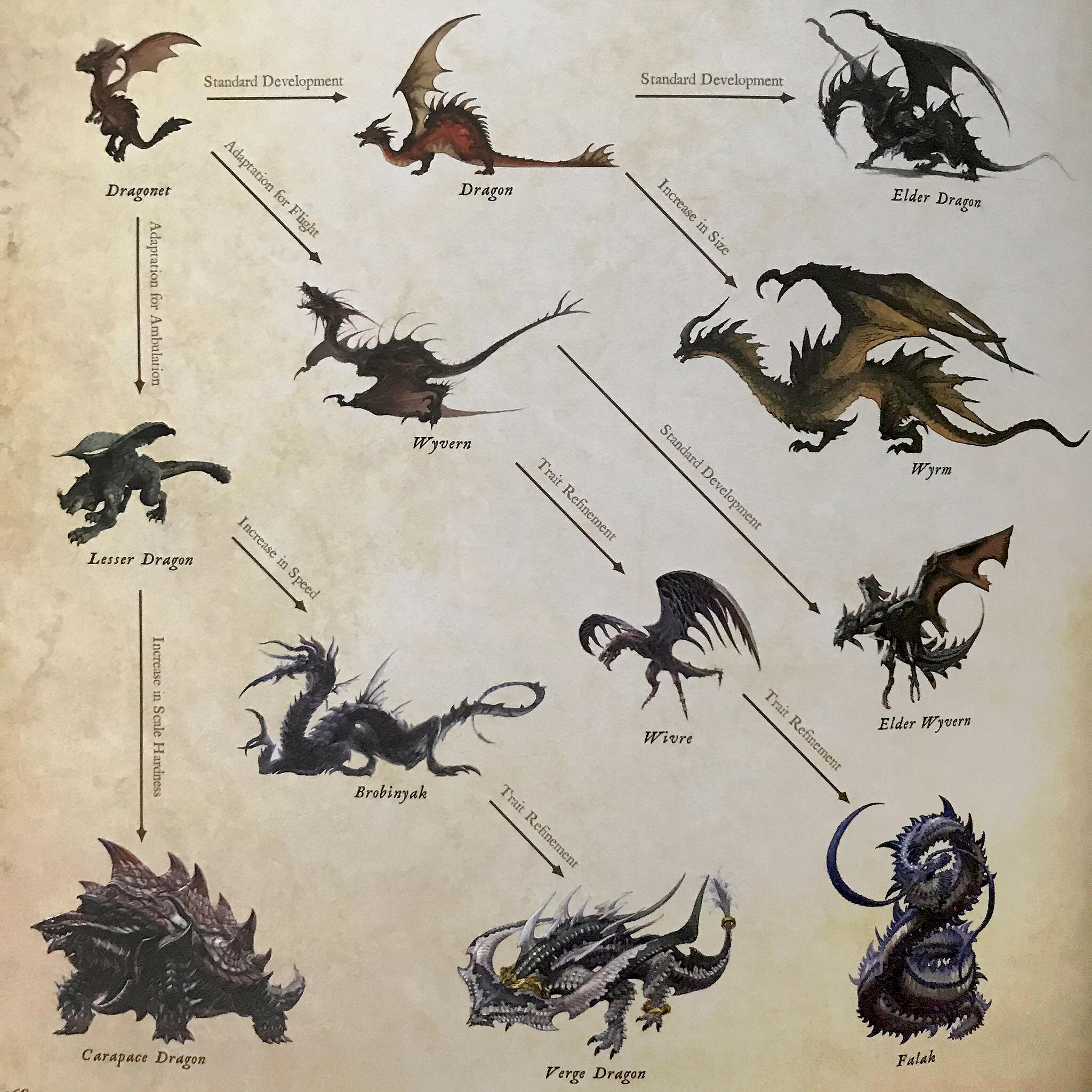
A Dragon's Behavior
(coming soon - dragon society, beliefs, and nature)
A Dragon's Existence
(coming soon - the impacts dragons have on the world and living creatures around them)
Dragons Through the Eras
(coming soon - timeline of draconic events through history)
If you've found this page, congrats! This is the hidden secret page for hidden secret things.Thank you ktisis devs for making the bone display so intuitive! Much of what was once written here is now irrelevant, and not nearly as convoluted as it once was to pose any of the dragons. However, their bone names remain A Mess TM—a mix of english, japanese, and abbreviations while simultaenously having just wayyyyy too many bones.
You will at least find one consistency—things are reliably labelled L and R (Left and Right).Here is my old cheat-sheet diagram of the various odd names and bone groups, in case it helps!
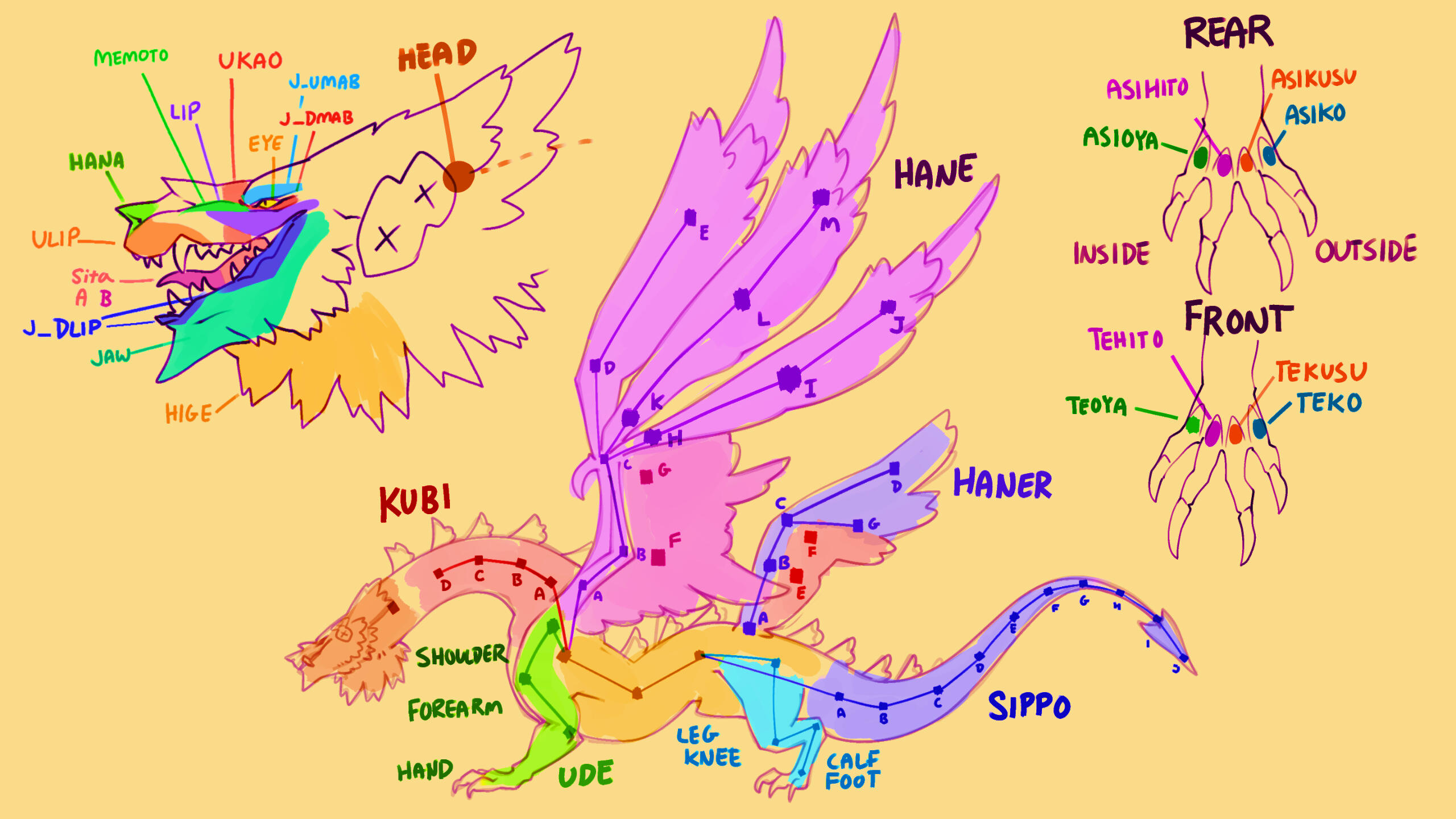
Ohokaliy! I'm Ahzuvi Fennix (Primal - Excalibur), local dragon enthusiast who thinks about them maybe a little too much. And draws them.I wanted to consolidate resources about the dragons of FFXIV into a single location, as current existing resources are scattered few and far between as old forum posts from HW-era role players, or whatever scraps happen to be preserved on the various game wikis. It's a passion project of mine to help lore enthusiasts and role players alike.This site is a massive work in progress, I have a LOT I want to add to it and I plan on citing a lot of sources for people to have an easier time finding information for themselves (honestly thats like half the work!). At the time of writing this, Dawntrail has been out for a few months and I'm just now getting back to pages I really needed to update long ago. I hope to have this fully finished by the time 7.2 comes out.If you ever need to contact me, questions or requests for certain refs, don't be afraid to reach out!
